

Travel to Vietnam in 2023: What You Need to Know About Restrictions and Requirements
by Thang Nguyen | Feb 13, 2023 | Travel Guides , Vietnam

Vietnam is a beautiful country with a rich history and culture, and it’s no wonder that it has become a popular travel destination . Though the COVID-19 pandemic is mostly controlled worldwide in general and in Vietnam in particular, travelers still need to be aware of and comply with the country’s travel restrictions and requirements .
In this post, we’ll keep you updated on the official travel restrictions, requirements, and guidance in Vietnam for 2023 . Please note that restrictions may vary depending on the traveler’s citizenship. To ensure you have the most accurate information, we recommend checking the official government website and contacting the Vietnamese embassy or consulate prior to your trip.

Stay informed with the latest travel restrictions, requirements, and needed travel guidance in Vietnam in 2023 we summarized below
- Quarantine requirements : There are no quarantine requirements for travelers to Vietnam.
- COVID-19 screening : Upon arrival in Vietnam, travelers may be subject to temperature checks.
- Negative COVID-19 test : As of April 2022, a negative COVID-19 test result is no longer required for entry into Vietnam.
- COVID-19 vaccine proof : Proof of vaccination is not currently required to enter Vietnam.
- Vaccinated travelers : Currently, there are no special allowances for vaccinated travelers in Vietnam. However, a negative COVID-19 test result and quarantine are no longer required.
- Booster shots : Booster shots are not required for travel to Vietnam. There is no set expiration period for vaccine validity.
- Health options : In case of a COVID-19 infection, hospitals, and clinics are available for treatment in Vietnam. Foreigners must pay for medical treatment out of pocket. Call the health hotline at 19009095 (Press 1 in English) if you experience COVID-19 symptoms. Foreign visitors can get tested for COVID-19 at designated laboratories, with the cost being free if the test result is negative and payable if it is positive.
- Businesses and restaurants : Most businesses and activities have resumed normal operations in Vietnam.
- Face masks : Face masks are no longer required in public places but are still mandatory on public transit and in health centers. Masks were required on flights into Vietnam.
- Public transportation : Buses and trains have resumed operation in Vietnam, with more daily flights and trains now available.
- Future restrictions : It is difficult to predict if Vietnam will impose new COVID-19 restrictions. The country no longer follows a “zero COVID” policy, so shutdowns are less likely now that vaccines are available. Restrictions may be imposed if the healthcare system becomes overwhelmed.

Overall, while travel to Vietnam may be more complicated than it was before the pandemic, it is still possible with careful planning and compliance with the country’s requirements and guidelines. Whether you’re interested in exploring Vietnam’s cities, beaches, or countryside, be sure to familiarize yourself with the current travel restrictions and requirements so you can have a safe and enjoyable trip.
Our knowledgeable and dedicated staff are always online to assist you. Ask us any questions you may have, and we will respond to you on time!
Share this:
Have questions about planning a trip to Vietnam? Let us help you!
Recent Posts
- Top 16 Things to Do in Hanoi With Expert Travel Guide
- Discovering the Beauty of Phong Nha-Ke Bang National Park
- Is Phong Nha Cave worth visiting? Explore answer with us
- Siem Reap Travel Guide: Top Attractions & Tips
- Is Solo Travel in Cambodia Safe? Essential Tips for Travelers
Get Your Free Ultimate Travel Guide Book to Vietnam
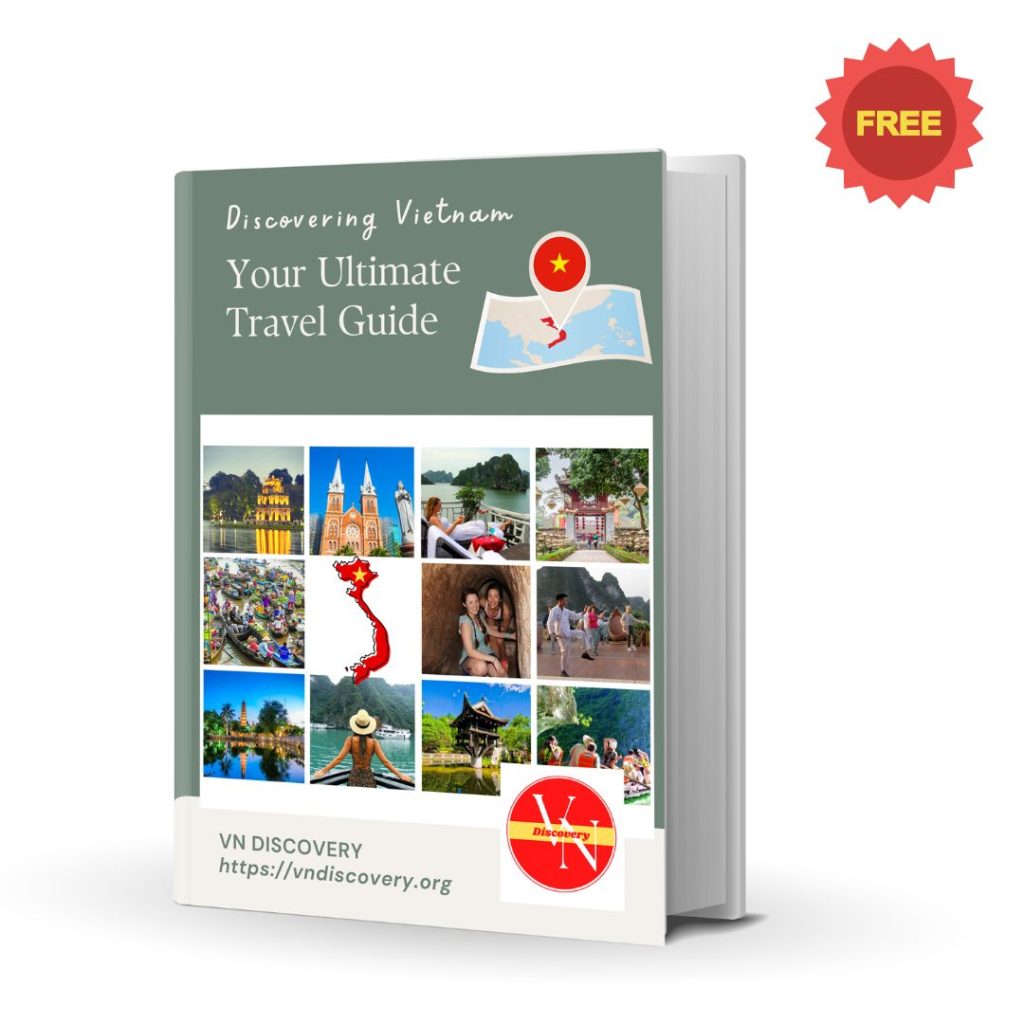
Our comprehensive guide is filled with insider tips, stunning photos, and detailed information on the best destinations and local experiences throughout Vietnam.
Instagram Posts
Submit your question.

- Green travel

Vietnam Entry Requirements for Travelers
Covid-19 entry requirements for travelers to vietnam.
UPDATED: September 2022
Since May 2022, travelers no longer need to show any Covid-19 vaccination or undergo any Covid-19 tests or quarantine to be allowed to enter Vietnam.
Within Vietnam, all destinations have fully opened up and the tourism industry is happy to welcome foreign guests again. Travelers do not need to worry about wearing masks except in busy public places such as airports, and can enjoy Vietnam’s beautiful nature, fascinating culture, and delicious food in full once again.
Read on for official Covid-19 entry requirements in Vietnam in 2023.
Entry requirements
Vietnam’s Ministry of Health no longer requires travelers to show any Covid-19 vaccination certificate, or undergo any test or quarantine upon arrival in Vietnam.
Travelers only need to hold a valid visa to be allowed entry, as well as carry medical or travel insurance with a minimum coverage of 10,000 USD for Covid-19 treatment.
Read more: Visas for travelers to Vietnam in 2023
Prevention within Vietnam
Travelers are still required to wear masks in airports, transportation terminals, and public places, but the locals are increasingly relaxed about wearing masks, especially in rural destinations such as Hoi An.
All travelers are requested to monitor their health closely within the first 10 days of arrival in Vietnam. Those who experience Covid-19 symptoms while within the country must call Vietnam’s health hotline (1900 3228) and follow the guidelines given by Vietnam’s health authorities.
Travelers who are concerned about their health and would like to be tested for Covid-19 can do so at any of Vietnam’s appointed health units around the country or at Vietnamese or international hospitals. Covid-19 self-tests are widely available from pharmacies across Vietnam and Quang Nam.
Read more : Health and Safety in Quang Nam
Using the PC-Covid app
PC-Covid is Vietnam’s official medical declaration app, and is available for Mac and Android in English and Vietnamese. Downloading the app is optional, but it can be used to check for Covid-19 outbreaks in locations around Vietnam, declare domestic moves such as flights within Vietnam, and to submit health declarations online.
The app will save your personal information the first time you enter it, so you will not have to fill out forms completely each time you declare your health.
- Download the PC-Covid app on Google Play here .
- Download the PC-Covid app on the App Store here .
Vietnam’s 5K Policy
Vietnam’s Ministry of Health encourages travelers and locals to follow these five guidelines to prevent the spread of Covid-19:
- Keep a safe distance from others
- Declare your health on the PC-Covid app
- Wear a mask when out in public
- Wash your hands regularly
- Avoid gatherings of large groups
Masks and hand sanitizer are easy to find throughout Quang Nam Province. To avoid creating unnecessary waste, bring or buy reusable masks that you can wash and wear again.

Privacy Preference Center
Privacy preferences.
You are using an outdated browser. Please upgrade your browser to improve your experience.
Vietnam Travel Requirements 2023 | Everything You Need To Know
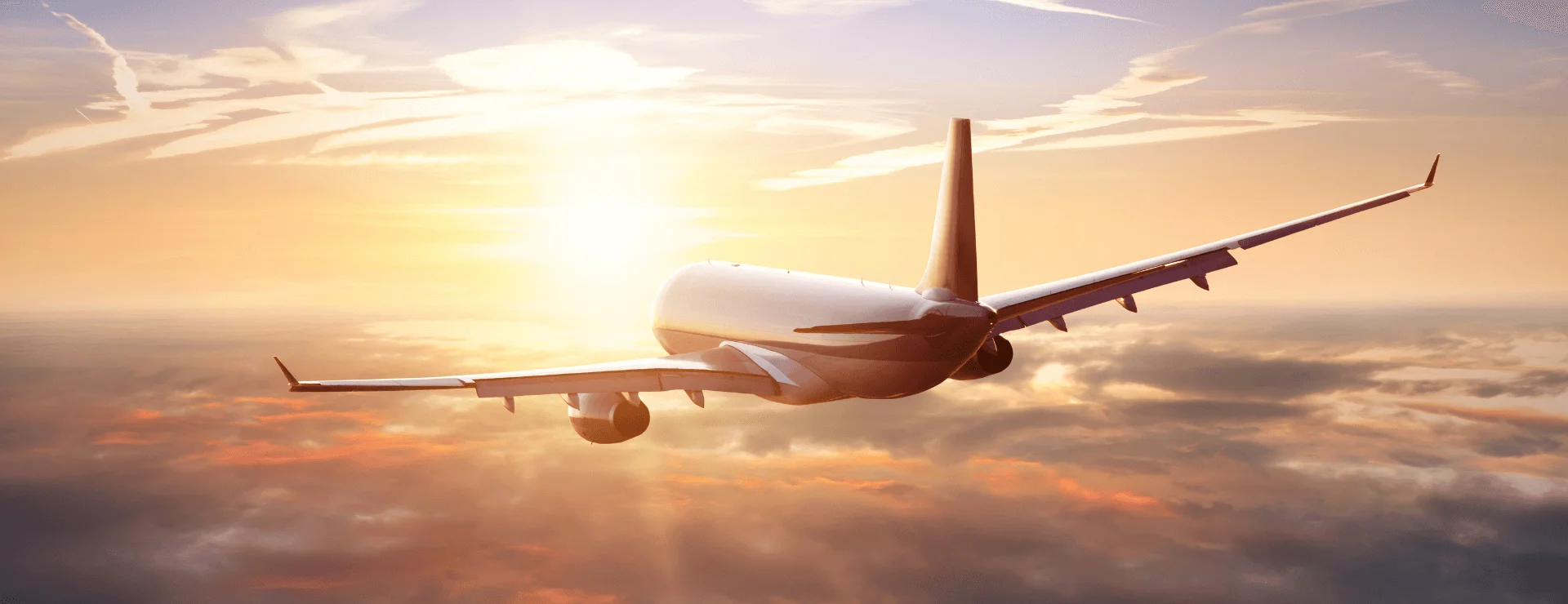
International travel to Vietnam has fully resumed. To make it easier for travelers to enter Vietnam while still upholding some health criteria, new entrance policies have been implemented. Learn more about the most recent Vietnam travel requirements for 2023, as well as tourist visa application guidance.

Visa Exempt
Visas are not required for tourists from the following countries, and they may remain for a specified number of days.
ASIA 14 days – Brunei, Myanmar. 15 days – Japan, South Korea (ROK). 21 days – The Philippines. 30 days – Cambodia, Indonesia, Laos, Malaysia, Singapore, Thailand.
EUROPE 15 days – Belarus, Denmark, Italy, Finland, France, Germany, Norway, Russia, Spain, Sweden, and The United Kingdom.
When you arrive in Vietnam, you can request a visa extension if you want to stay longer.
Visa Required
Visitors whose countries are not eligible for visa-exempt will have to apply for a Vietnam e-Visa, valid for 30 days. As of July 2020, Vietnam’s e-Visa is available to nationals of 80 countries .
The fee for an e-visa is $25 USD , and the processing time is 3 working days. The code to print your visa will be sent to you by email.
*The application fee of $25 USD is non-refundable, under any circumstance, regardless of the result.
Vietnam’s e-Visa Application Process
Please follow this guide to apply for a Vietnam’s e-Visa.
Vietnam’s e-Visa requirements
Prepare the following documents ahead of your application:
- A passport with six (6) months’ validity
- A photo in .jpg format of your full passport data page
- A passport photo in .jpg format (4×6, white background, without glasses)
- A valid international credit or debit card
- An email address for support purposes
- A temporary address within Vietnam
- Your entry and exit dates and entry and exit points/airports
- Travel insurance – medical/travel insurance with a $10,000 minimum coverage covers COVID-19 treatment. (usually, this costs around $40 USD .)
Steps to apply for Vietnam’s e-Visa
After you have got all the necessary documents, proceed with the application.
Step 1 : Go to the e-visa page or the National Immigration Web Portal . Choose ‘E-visa Issuance’ then click on the link for ‘Outside Vietnam foreigners’.
Step 2 : Fill out all of the essential fields on the form after uploading your.jpg pictures (passport data page and passport photo). Submit your form.
Step 3 : Pay the e-Visa fee of 25 USD. Copy down the document code provided.
Step 4 : You should receive an email notification of the status of your e-Visa application in three working days. If not, you can use this link to do a search for your e-Visa.
Step 5 : Find your e-Visa online with your document code. Download and print two copies of the e-Visa for added security.
You may enter the nation by any of the 28 international checkpoints , including eight international airports, using your current e-Visa. Please go here to get a complete list of the ports of entry, seaports, and airports that accept the e-Visa.
Other Notices Regarding Vietnam Travel Requirements
- Always double-check all the information on your e-Visa application form. The most common mistakes while submitting an e-Visa application for Vietnam are inputting the incorrect name and passport number, uploading wrong or low-quality photos, and selecting the wrong port of entry.
- If you have a visa exemption, such as for a period of 15 days, you may enter Vietnam, remain there, and then leave. You may then reenter Vietnam whenever you like and receive another 15 days.
- After you apply, e-visas typically take 3 days or up to 1 week. Make sure you apply early enough or you won’t get one before arriving.
- When you arrive, you can head straight to the immigration counter if you have an e-visa. If, however, you are exempt, head over to the counter for visas on arrival.
- Your visa will be stamped by an immigration official, who may also add the letters EV (electronic visa).
- To protect both yourself and others, you should follow common heath practices – such as regularly washing your hands, covering your nose and mouth when you sneeze or cough, and eating food that has been well prepared.
- Over the first 10 days of your stay in Vietnam, you must monitor your health. Call Vietnam’s health hotline at 1900 3228 as soon as you experience COVID-19 symptoms – fever, cough, or difficulty breathing.
Frequently Asked Questions
1. What if the Vietnam e-Visa application isn’t working properly? If you submitted your Vietnam e-Visa application incorrectly or there is a problem with it, you can send a message to the customer service representatives on the official website and detail the problem, such as incorrect information, a failed payment, or a forgotten registration code.
2. What if I provided invalid information on the Vietnam e-Visa application form?
The immigration department may ask for more information or, in unusual circumstances, may reject you if your application form is incomplete or contains inaccurate information.
If you need to supply more information for your Vietnam e-Visa, you will be contacted and asked to do so. Once you have submitted all the necessary data, the processing period will begin again.
3. What do I need to present upon arrival with the Vietnam e-Visa?
You must show a printed copy of the Vietnam e-Visa document you received (print from PDF) as well as your passport while entering Vietnam with your e-Visa.
4. Can I arrive on different dates than stated on the e-Visa?
You can arrive after the date of the entrance you specified on the Vietnam e-Visa application, but you cannot arrive earlier.
The days begin counting from the entry date you set after your visa is issued, regardless of whether it arrived late. Keep in mind that you must specify the exact arrival date when you apply.
5. Can I get an extension on my 30-day e-Visa?
Yes, but this can only be done from within Vietnam.
Let Us Help You Plan Your Vietnam Trip Don’t let the planning stress you out. Tell us your travel ideas and our travel advisors are very glad to give you suggestions and guidance for your trip planning. We offer personalized tours according to your interests and requirements and help to create the best Vietnam vacation for you.
You may also be interested in

- May 16, 2024
The 12 Best Beach Resorts in Bali For A Fantastic Holiday In This Summer

- May 10, 2024
An Easy Guide On Planning Your Angkor Wat Tour

- May 8, 2024
Exciting News: Apple Pay Is Now Available For APT's Tourists!
Vietnam Travel Restrictions
Traveler's COVID-19 vaccination status
Traveling from the United States to Vietnam
Open for vaccinated visitors
COVID-19 testing
Not required
Not required for vaccinated visitors
Restaurants
Not required in public spaces and public transportation.
Ready to travel?
Find flights to vietnam, find stays in vietnam, explore more countries on travel restrictions map, destinations you can travel to now, dominican republic, netherlands, philippines, puerto rico, switzerland, united arab emirates, united kingdom, know when to go.
Sign up for email alerts as countries begin to open - choose the destinations you're interested in so you're in the know.
Can I travel to Vietnam from the United States?
Most visitors from the United States, regardless of vaccination status, can enter Vietnam.
Can I travel to Vietnam if I am vaccinated?
Fully vaccinated visitors from the United States can enter Vietnam without restrictions.
Can I travel to Vietnam without being vaccinated?
Unvaccinated visitors from the United States can enter Vietnam without restrictions.
Do I need a COVID test to enter Vietnam?
Visitors from the United States are not required to present a negative COVID-19 PCR test or antigen result upon entering Vietnam.
Can I travel to Vietnam without quarantine?
Travelers from the United States are not required to quarantine.
Do I need to wear a mask in Vietnam?
Mask usage in Vietnam is not required in public spaces and public transportation.
Are the restaurants and bars open in Vietnam?
Restaurants in Vietnam are open. Bars in Vietnam are .
All You Need to Know Before Traveling to Vietnam in 2023
March 13, 2023, 2:04 am

Vietnam is a country offering a one-of-a-kind blend of history, culture, and natural beauty. From the bustling streets of Hanoi to the serene waters of Halong Bay, there are countless experiences waiting for those who wish to explore this Southeast Asian gem.
If you’re considering a trip to Vietnam in 2023, there are a few things you should be aware of before packing your bags.
In this blog post, we’ll cover everything from visa requirements to local customs to help make your trip to Vietnam unforgettable. So sit back, grab a cup of coffee, and let’s dive into this ultimate guide before you set off for Vietnam this year.
Obtain a visa before arriving in Vietnam
If you plan a trip to Vietnam, you should be aware that there are certain documents that must be gathered prior to the trip.
Apart from a valid passport that must remain valid for at least 6 months from the date of your planned arrival in Vietnam, you may also need to hold a valid visa.
Fortunately, since 2017, Vietnam has been offering electronic visas covering short-term trips to Vietnam related to tourism, business, or transit.
A holder of the Vietnam eVisa can stay in the country for up to 30 days, while the visa remains valid for 30 days as well.
In order to get an eVisa to Vietnam , one needs to make sure that their nationality is eligible for online visa application and then simply follow three steps, including:
- Fill out the online form : indicate your traveling motive and provide all the required details in the online application form; attach your face photo as well as a digital copy of your passport’s bio-data page.
- Cover the processing fee : choose one type of available methods of online patent and pay the service fee.
- Receive the approved eVisa : refresh your email address and download the approved document.
The processing time should take up to 5 business days. Make sure to apply at least 5 days before the planned arrival in Vietnam to receive your visa on time.
Be aware of weather conditions and climate
Vietnam features a year-round tropical climate with average temperatures ranging from 18 – 28°C. However, Vietnam also has distinct wet (May to October) and dry (November to April) seasons.
Knowing which season you’re traveling during will help ensure your visit is full of safe discoveries and enjoyable memories. Vietnam can be especially humid during the wet months, so visitors should plan accordingly by bringing comfortable clothes and accessories that are easy to layer or remove depending on the temperature outside.
Additionally, Vietnam exposes coastal areas and tourists to the threat of typhoons during September and October. Though these storms may look intimidating at first, they can provide an amazing show of nature if the proper precautions are taken beforehand.
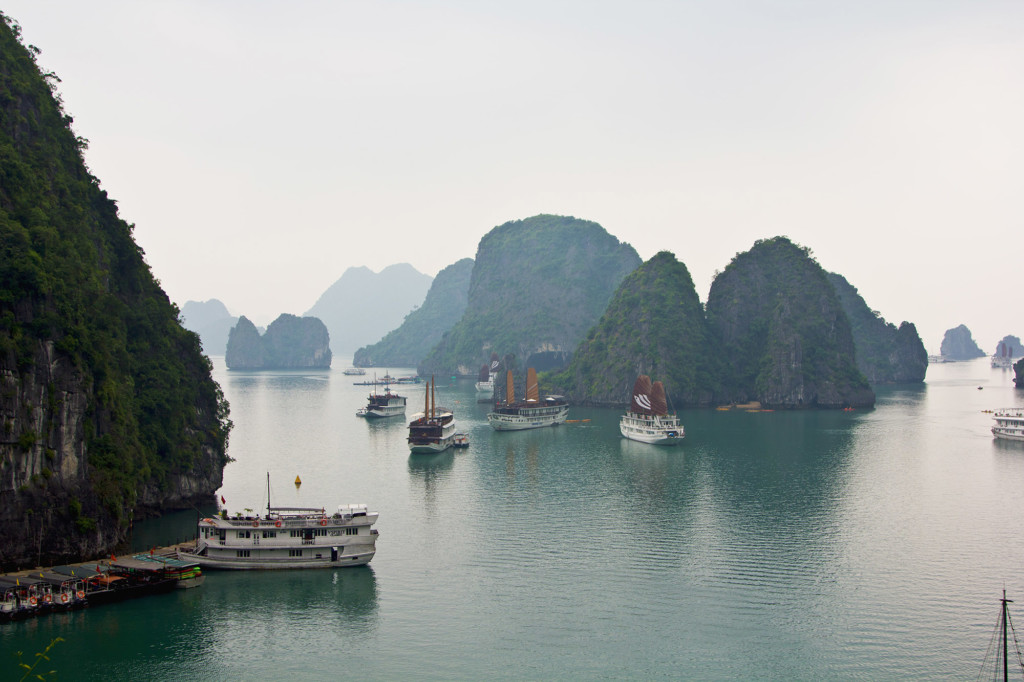
Be ready to meet one of the most hospitable nations in Asia
Vietnamese people are renowned for their friendly nature, showcasing their warmth and hospitality to visitors from around the world. The Vietnamese culture is full of welcoming smiles and generous spirits, making Vietnamese people some of the most hospitable in all of Asia.
This spirit of kindness is deeply embedded in Vietnamese society and has been a key part of Vietnamese life for centuries. Their optimism despite hardships shines through every conversation, showcasing an amazing level of resilience and strength. Vietnamese people are truly inspiring, with their friendly demeanor radiating an essence that stays with you once you’ve moved on.
Check other entry requirements to enter Vietnam
Vietnam’s entry requirements have been updated to ensure that citizens around the globe can explore its unique culture with ease.
Visitors from all corners of the world are no longer required to produce a negative COVID-19 test result or present a vaccination certificate on arrival, lessening the administrative burden and emboldening individuals to make Vietnam their next travel destination.
Of course, airlines may still have different requirements before boarding, so it is important for travelers to make sure they check with their airline before embarking on their journey. It definitely looks like Vietnam is open again, and its diversity of landscapes and experiences await!
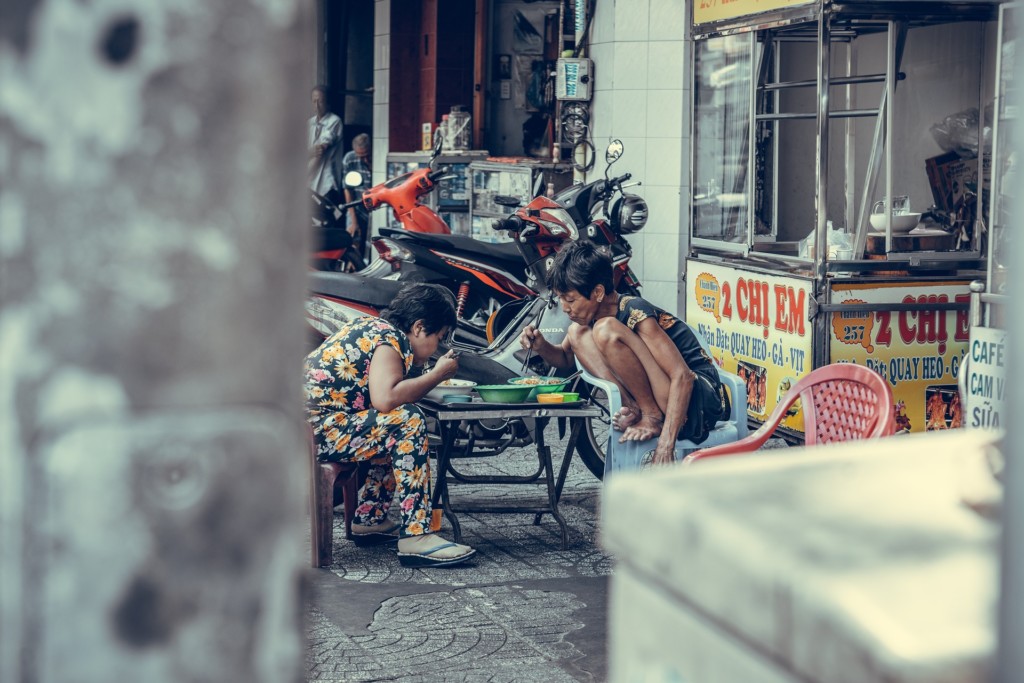
Try unforgettable Vietnamese cuisine
Exploring Vietnam’s amazing cuisine is a must when visiting this beautiful country! From the street food to exotic dishes served in fine dining establishments, there is something for everyone and every taste.
Make sure to try some of the authentic Vietnamese specialties like Pho Noodles, Banh Mi Sandwiches, Goi Cuon Spring Rolls, or Bun Bo Hue Spicy Beef Soup.
There are countless flavors and varieties that make up Vietnamese cuisine, allowing you to try delicious food every day of your visit. Let Vietnam’s delightful flavors tantalize your taste buds!
Be aware of road safety
When in Vietnam, traffic can be intense, and it is important to always be mindful of road safety. Although traffic may surprise you with its speed and density, keep calm and take your time when crossing the street.
Remember that safety not only protects you from traffic incidents but also helps contribute to traffic peace and orderliness in the long run for both residents and international visitors. Your own actions on the streets of Vietnam can make a difference, so pay attention to your surroundings to keep yourself – as well as those around you – safe!
Bottom Line
Whether you’re looking for adventure or a peaceful place to relax, Vietnam has it all! The culture and cuisine are truly unique, so be sure to explore every corner you can while in Vietnam – no matter where you go, there will always be something special waiting for you.
Share this:
- Click to share on Twitter (Opens in new window)
- Click to share on Facebook (Opens in new window)
Other related travel tips
What do you think, leave a reply cancel reply.
Your email address will not be published. Required fields are marked *
By using this form you agree with the storage and handling of your data by this website. *
Notify me of follow-up comments by email.
Notify me of new posts by email.
Loading…

Best Things to See and Do in London

How to Plan Your First Trip to Oman
Username or Email Address
Forgot password?
Enter your account data and we will send you a link to reset your password.
Your password reset link appears to be invalid or expired.
Privacy policy.
To use social login you have to agree with the storage and handling of your data by this website.
Add to Collection
Public collection title
Private collection title
No Collections
Here you'll find all collections you've created before.
This site uses functional cookies and external scripts to improve your experience.
Privacy Settings
This site uses functional cookies and external scripts to improve your experience. Which cookies and scripts are used and how they impact your visit is specified on the left. You may change your settings at any time. Your choices will not impact your visit.
NOTE: These settings will only apply to the browser and device you are currently using.
Advertising
Click ‘Enable’ to allow in Your Pocket and our partners to use cookies and similar technologies to access your device and use your data (including location) to understand your interests, and provide and measure personalised ads. We will also provide you with personalised ads on partner products.
- Skip to main content
- Skip to "About this site"
Language selection
Search travel.gc.ca.
Help us to improve our website. Take our survey !
COVID-19: travel health notice for all travellers
Vietnam travel advice
Latest updates: The Need help? section was updated.
Last updated: May 13, 2024 07:00 ET
On this page
Safety and security, entry and exit requirements, laws and culture, natural disasters and climate, vietnam - exercise a high degree of caution.
Exercise a high degree of caution in Vietnam due to high rate of petty crime.
Back to top
Petty crime
Petty crime, such as pickpocketing and purse snatching, occurs frequently. It’s most prevalent in larger cities and may increase during major public holidays, such as Tet (Lunar New Year).
Criminals work alone or in groups and may use various techniques to distract you and steal your belongings. They may try to grab your bag and other valuables while passing on a motorbike or slash your bag in crowded streets and markets.
Theft is frequent:
- in popular tourist areas
- in markets, shopping centres and commercial streets
- on public transportation including sleeper trains
- in transportation hubs such as airports and train stations
- in restaurants, including patios and outdoor cafés
- at beaches and seaside destinations
While travelling:
- ensure that your belongings, including your passport and other travel documents, are secure at all times
- keep a digital copy of your identity and travel documents
- avoid showing signs of affluence or wearing expensive jewellery
- avoid carrying large sums of cash
- avoid isolated areas, especially at night
- pay attention to your surroundings, particularly in crowded and tourist areas
- be extra cautious when withdrawing cash from ATMs
Violent crime
Although violent crimes targeting foreigners are rarer, they may occur. In some cases, criminals have used weapons such as knives and razors. Threats of physical injury related to personal disputes also occasionally occur.
- If you are involved in a dispute, contact the police as soon as possible
- If you are threatened by robbers, don’t resist
Residential break-ins
Residential break-ins occur, especially in large cities and may increase before and during the Tet holiday (Lunar New Year). Burglars may target houses or apartments rented or owned by tourists and foreigners.
- Stay in accommodations with adequate security measures
- Make sure you lock doors and windows at night and when you’re away
Women’s safety
Women travelling alone may be subject to some forms of harassment and verbal abuse. Sexual assault and harassment do occur, including:
- in beach destinations
- in bars, nightclubs and entertainment districts
- on taxis and public transportation
Local authorities may not always respond adequately to reports of sexual violence and harassment. If you are a victim of sexual assault:
- seek immediate medical assistance, whether or not you appear to have been physically harmed
- contact the local police and ensure they file a report
- inform consular officials at the nearest Canadian embassy or consulate
Advice for women travellers
Credit card and ATM fraud
Credit and debit card as well as ATM fraud occurs frequently.
- Avoid using your credit card in small establishments
- Consider using a card with a small credit limit
- Cover the keypad with one hand when entering your PIN
- Pay careful attention when others are handling your cards
- Avoid using card readers with an irregular or unusual feature
- Use ATMs located in public areas or inside a bank or business
- Check for any unauthorized transactions on your account statements
Cybercrime occurs. Perpetrators may compromise public Wi-Fi networks to steal credit card or personal information.
- Avoid using unsecured public Wi-Fi networks
- Avoid making purchases on unencrypted websites
- Be cautious when posting information on social media
- Be especially vigilant if you decide to meet someone you met online
- Don’t click a suspicious link in an email or text message asking for your credit card details
At the airport
Criminals posing as taxi drivers have targeted foreign visitors at Nội Bài International Airport in Hanoi and robbed them by forcing them to withdraw money from ATMs.
Travellers have also been robbed by drivers who greeted them upon arrival with a placard showing their name.
- Arrange your pickup with your hotel before arrival, or use authorized airport taxis
- Confirm the driver’s identity and the licence plate before getting in the car
Gambling scams
Tourists have been victims of gambling scams in Hanoi, as well as in Ho Chi Minh City, particularly in the Pham Ngu Lao neighbourhood.
The scam consists of a friendly invitation sent to the victim to go to someone’s home in order to meet a relative interested in visiting Canada. While waiting for the relative, the scammers suggest a casual game of cards involving an initial small wager. Some victims have lost thousands of dollars over the course of an evening.
Be wary of unsolicited proposals from strangers.
If you’ve been scammed:
- get to a safe location immediately
- take note, as soon as possible, of the name and address of the facility where you were held
- notify the police and obtain a report
- if a bank card was involved, report the scam to your banking company, which will likely request a copy of the police report to cancel the transaction
Overseas fraud
Spiked food and drinks
Snacks, beverages, gum and cigarettes may contain drugs that could put you at risk of sexual assault and robbery.
- Be wary of accepting these items from new acquaintances
- Never leave food or drinks unattended or in the care of strangers
Unregulated alcohol
Some people died after consuming unregulated and adulterated rice wine due to high levels of methanol.
- Be cautious if you choose to drink alcohol
- Only consume reputable alcohol brands
- Avoid buying alcohol from individuals or street vendors
- Seek medical assistance if you begin to feel sick
Alcohol, drugs and travel
Demonstrations
Current situation in dak lak.
An increased police presence in Dak Lak continues, after organized attacks on a police station in June 2023.
If you are in the area, do not photograph security forces.
Public demonstrations are rare since local authorities don’t usually authorize them. Demonstrating without authorization can lead to heavy consequences, including lengthy prison sentences.
- Avoid areas where demonstrations and large gatherings are taking place
- Don’t photograph demonstrations
- Follow the instructions of local authorities
- Monitor local media for information on ongoing demonstrations
Mass gatherings (large-scale events)
Internet censorship and surveillance
Within the Vietnamese territory, local authorities block access to several:
- social media
- search engines
- online services
You shouldn’t expect internet privacy.
Local authorities may monitor your communications at any time. They may review the content stored or consulted on your electronic devices. They may also place certain foreigners under electronic surveillance. They can search your home or hotel room without your knowledge or consent.
Cyber security while travelling
Foreign journalists and other media workers in Vietnam may face considerable restrictions in the context of their work. The Vietnamese government may employ measures such as:
- physical and electronic surveillance
- delaying or refusing renewals of press cards and visas
- intimidation and harassment
Be particularly vigilant if researching or reporting on subjects critical of or sensitive to the government.
Landmines and war remnants
Landmines and unexploded ordnance still pose a serious risk in several areas, particularly:
- in the province of Quảng Trị
- along the border with Laos
- in North and Central Vietnam
Unmarked minefields are common. If you plan travelling outside of major tourist destinations:
- pay attention to signs indicating the possible presence of landmines
- remain on paved roads
- avoid open fields, roadside ditches, shoulders and unmarked trails
- report any suspicious items to local authorities
Adventure tourism
Outdoor activities, such as trekking, zip-lining, rock climbing, speleology, or parasailing and other adventure activities can be dangerous if unprepared. Trails are not always marked, and weather conditions can change rapidly, especially during the rainy season.
Tour operators may not always adhere to international safety standards.
If you intend to practice adventure tourism:
- never do so alone, and do not part with your expedition companions
- consider hiring an experienced guide from a reputable company
- obtain detailed information on your activity and on the environment in which you will be setting out
- buy travel insurance that includes helicopter rescue and medical evacuation
- ensure that your physical condition is good enough to meet the challenges of your activity
- avoid venturing off marked trails
- ensure that you’re adequately equipped and bring sufficient water
- stay informed about weather and other conditions that may pose a hazard
- refrain from using facilities or equipment if you have doubts on their safety
- inform a family member or friend of your itinerary
Water activities
Tidal changes and strong winds can cause hazardous currents and riptides.
Swimming and diving
Beaches are not always supervised.
Corals, sea urchins, jellyfish and other aquatic life found along reefs may be poisonous. A sting to the touch can cause poisoning or infection.
If you plan to dive:
- choose a reputable company
- always respect warning flags advising of dangerous conditions
- ask about the presence of dangerous species
- seek immediate medical attention in case of injury
- wear swimming shoes to protect yourself from reefs, rocks, corals or sea urchins
- keep a safe distance from boats and restricted areas
- avoid beaches or coastal areas during periods of severe weather warnings
- avoid diving into unknown waters, as hidden rocks or shallow depths can cause serious injury or death
- follow the advice of the local authorities
Boat accidents have occurred due to the overloading and poor maintenance of some vessels, including in Ha Long Bay.
- Choose a reputable boating company
- Ensure that your tour operator follows up-to-date safety regulations
- Don’t board vessels that appear overloaded or unseaworthy
Water safety abroad
Although rare in Vietnam, pirates commit attacks and armed robbery against ships in coastal waters.
Live piracy report - International Maritime Bureau
Road safety
Road safety is poor throughout the country.
Fatal accidents are frequent. They frequently involve motorcycle and pedestrians are commonly victims.
Always use elevated walkways or pedestrian bridges when available.
Road conditions
Road conditions are poor throughout the country.
Driving can be dangerous due to:
- poorly maintained roads and vehicles
- traffic jams and heavy traffic, especially in urban areas
- potholes
- slippery roads during the rainy season
Driving habits
Drivers don’t always respect traffic laws.
Some vehicles, especially motorcycles, drive against the flow of traffic and on the sidewalks.
If you plan to travel by car in Vietnam, you should consider hiring a driver.
If you choose to drive:
- always drive defensively
- avoid travelling after dark or during adverse weather conditions
- avoid driving a motorcycle
- Make sure you have proper insurance and a valid licence
Public transportation
Official taxis are generally safe.
Motorcycle taxis (known as “xe oms”) are not safe.
- Avoid motorcycle taxis
- Use only official taxis or a trusted ridesharing app
- Negotiate the fare in advance, or insist that the driver use the meter
- Never share a taxi with a stranger
- Be familiar with your hotel’s address and the neighbourhood to avoid being brought to a wrong location
Bus and coach accidents are common.
Trains are generally reliable.
Thefts have been reported on certain train lines, including sleeper trains.
Ticket stub is required to exit the train station. Passengers without a ticket stub will be required to pay the fare again.
Retain your ticket stub when travelling by train.
Ferry accidents have occurred due to the overloading and poor maintenance of some vessels, particularly on the line connecting Ho Chi Minh City to Vung Tau.
Don’t board vessels that appear overloaded or unseaworthy.
Transport within Vietnam - Vietnam Tourism
We do not make assessments on the compliance of foreign domestic airlines with international safety standards.
Information about foreign domestic airlines
Every country or territory decides who can enter or exit through its borders. The Government of Canada cannot intervene on your behalf if you do not meet your destination’s entry or exit requirements.
We have obtained the information on this page from the Vietnamese authorities. It can, however, change at any time.
Verify this information with the Foreign Representatives in Canada .
Entry requirements vary depending on the type of passport you use for travel.
Before you travel, check with your transportation company about passport requirements. Its rules on passport validity may be more stringent than the country’s entry rules.
Regular Canadian passport
Your passport must be valid at least 6 months beyond the date you expect to leave Vietnam.
Passport for official travel
Different entry rules may apply.
Official travel
Passport with “X” gender identifier
While the Government of Canada issues passports with an “X” gender identifier, it cannot guarantee your entry or transit through other countries. You might face entry restrictions in countries that do not recognize the “X” gender identifier. Before you leave, check with the closest foreign representative for your destination.
Other travel documents
Different entry rules may apply when travelling with a temporary passport or an emergency travel document. Before you leave, check with the closest foreign representative for your destination.
Useful links
- Foreign Representatives in Canada
- Canadian passports
Tourist visa: required Business visa: required Student visa: required Work visa: required
E-visa authorization
If you have a valid Canadian passport, you may be eligible to apply online for an e-visa. This can be a single-entry or multiple-entry electronic tourist visa, valid for a maximum of 90 days. It allows you to enter Vietnam via the port of entry indicated in the visa approval notice only. Some restrictions apply.
For visits longer than 90 days, you must get a visa from the nearest Vietnamese embassy before departure.
Apply for an e-visa - Immigration Department of Vietnam
Visa exemptions
Canadian spouses or children of Vietnamese citizens may be eligible for a visa exemption certificate.
Contact the Embassy of Vietnam in Canada for more information on this process.
Visa extension
You must have a visa to enter Vietnam.
If required, you can request a visa extension at:
- the Vietnam Immigration Department in Hanoi or Ho Chi Minh City
- certain local travel agencies and tour companies
Vietnamese visas in expired Canadian passports are not valid. The visa needs to be transferred to the new passport.
Overstaying your Vietnamese visa or having the wrong type of visa is a serious matter. You may be delayed from onward travel until a fine is paid.
Check the visa validity and conditions carefully.
Registration
You must report your presence to local authorities upon arrival.
Commercial accommodations will generally file the declaration on your behalf. If you're staying in a non-commercial accommodation, you must do so with the nearest police station.
Make sure you request the return of your passport once it has been registered by hotel staff.
The hotel staff may ask to see your passport at check-in. They may make copies of it. They may also insist on holding your passport until you leave. There is no legal reason for this.
- Never leave your passport or any other ID document with anyone
- Ask for your documents to be returned to you as soon as check-in is complete
Travel restrictions
Travel near military facilities is restricted:
- in some parts of the central highlands
- in some border area
If you wish to visit a village, commune or ward that is close to the border, you must obtain permission from the provincial police department.
Contact the relevant local authority to confirm these requirements.
Health screening
Upon entry, you may be subject to a body temperature check.
Vietnamese authorities may place an exit ban on certain individuals to prevent them from leaving the country.
An exit ban can relate to investigations into:
- an individual, their family or an employer
- criminal and civil matters, such as business disputes or motor vehicle accidents
- employment without a valid work permit
- unpaid financial debts
It is difficult to obtain information on bans from Vietnamese authorities. An exit ban can be requested by people involved in any of these circumstances. You may not be aware that authorities have placed an exit ban on you until you try to leave the country. Your passport may be seized until the case is fully investigated and settled.
If you're unable to leave the country because of an exit ban, consult a lawyer and contact the closest office of the Government of Canada.
Children and travel
Learn more about travelling with children .
Yellow fever
Learn about potential entry requirements related to yellow fever (vaccines section).
Relevant Travel Health Notices
- Global Measles Notice - 13 March, 2024
- Zika virus: Advice for travellers - 31 August, 2023
- COVID-19 and International Travel - 13 March, 2024
This section contains information on possible health risks and restrictions regularly found or ongoing in the destination. Follow this advice to lower your risk of becoming ill while travelling. Not all risks are listed below.
Consult a health care professional or visit a travel health clinic preferably 6 weeks before you travel to get personalized health advice and recommendations.
Routine vaccines
Be sure that your routine vaccinations , as per your province or territory , are up-to-date before travelling, regardless of your destination.
Some of these vaccinations include measles-mumps-rubella (MMR), diphtheria, tetanus, pertussis, polio, varicella (chickenpox), influenza and others.
Pre-travel vaccines and medications
You may be at risk for preventable diseases while travelling in this destination. Talk to a travel health professional about which medications or vaccines may be right for you, based on your destination and itinerary.
Yellow fever is a disease caused by a flavivirus from the bite of an infected mosquito.
Travellers get vaccinated either because it is required to enter a country or because it is recommended for their protection.
- There is no risk of yellow fever in this country.
Country Entry Requirement*
- Proof of vaccination is not required to enter this country.
Recommendation
- Vaccination is not recommended.
* It is important to note that country entry requirements may not reflect your risk of yellow fever at your destination. It is recommended that you contact the nearest diplomatic or consular office of the destination(s) you will be visiting to verify any additional entry requirements.
About Yellow Fever
Yellow Fever Vaccination Centres in Canada
There is a risk of hepatitis A in this destination. It is a disease of the liver. People can get hepatitis A if they ingest contaminated food or water, eat foods prepared by an infectious person, or if they have close physical contact (such as oral-anal sex) with an infectious person, although casual contact among people does not spread the virus.
Practise safe food and water precautions and wash your hands often. Vaccination is recommended for all travellers to areas where hepatitis A is present.
Measles is a highly contagious viral disease. It can spread quickly from person to person by direct contact and through droplets in the air.
Anyone who is not protected against measles is at risk of being infected with it when travelling internationally.
Regardless of where you are going, talk to a health care professional before travelling to make sure you are fully protected against measles.
Japanese encephalitis is a viral infection that can cause swelling of the brain. It is spread to humans through the bite of an infected mosquito. Risk is very low for most travellers. Travellers at relatively higher risk may want to consider vaccination for JE prior to travelling.
Travellers are at higher risk if they will be:
- travelling long term (e.g. more than 30 days)
- making multiple trips to endemic areas
- staying for extended periods in rural areas
- visiting an area suffering a JE outbreak
- engaging in activities involving high contact with mosquitos (e.g., entomologists)
Hepatitis B is a risk in every destination. It is a viral liver disease that is easily transmitted from one person to another through exposure to blood and body fluids containing the hepatitis B virus. Travellers who may be exposed to blood or other bodily fluids (e.g., through sexual contact, medical treatment, sharing needles, tattooing, acupuncture or occupational exposure) are at higher risk of getting hepatitis B.
Hepatitis B vaccination is recommended for all travellers. Prevent hepatitis B infection by practicing safe sex, only using new and sterile drug equipment, and only getting tattoos and piercings in settings that follow public health regulations and standards.
Malaria is a serious and sometimes fatal disease that is caused by parasites spread through the bites of mosquitoes. There is a risk of malaria in certain areas and/or during a certain time of year in this destination.
Antimalarial medication may be recommended depending on your itinerary and the time of year you are travelling. Consult a health care professional or visit a travel health clinic before travelling to discuss your options. It is recommended to do this 6 weeks before travel, however, it is still a good idea any time before leaving. Protect yourself from mosquito bites at all times: • Cover your skin and use an approved insect repellent on uncovered skin. • Exclude mosquitoes from your living area with screening and/or closed, well-sealed doors and windows. • Use insecticide-treated bed nets if mosquitoes cannot be excluded from your living area. • Wear permethrin-treated clothing. If you develop symptoms similar to malaria when you are travelling or up to a year after you return home, see a health care professional immediately. Tell them where you have been travelling or living.
In this destination, rabies is carried by dogs and some wildlife, including bats. Rabies is a deadly disease that spreads to humans primarily through bites or scratches from an infected animal. While travelling, take precautions , including keeping your distance from animals (including free-roaming dogs), and closely supervising children.
If you are bitten or scratched by an animal while travelling, immediately wash the wound with soap and clean water and see a health care professional. Rabies treatment is often available in this destination.
Before travel, discuss rabies vaccination with a health care professional. It may be recommended for travellers who are at high risk of exposure (e.g., occupational risk such as veterinarians and wildlife workers, children, adventure travellers and spelunkers, and others in close contact with animals).
Coronavirus disease (COVID-19) is an infectious viral disease. It can spread from person to person by direct contact and through droplets in the air.
It is recommended that all eligible travellers complete a COVID-19 vaccine series along with any additional recommended doses in Canada before travelling. Evidence shows that vaccines are very effective at preventing severe illness, hospitalization and death from COVID-19. While vaccination provides better protection against serious illness, you may still be at risk of infection from the virus that causes COVID-19. Anyone who has not completed a vaccine series is at increased risk of being infected with the virus that causes COVID-19 and is at greater risk for severe disease when travelling internationally.
Before travelling, verify your destination’s COVID-19 vaccination entry/exit requirements. Regardless of where you are going, talk to a health care professional before travelling to make sure you are adequately protected against COVID-19.
Safe food and water precautions
Many illnesses can be caused by eating food or drinking beverages contaminated by bacteria, parasites, toxins, or viruses, or by swimming or bathing in contaminated water.
- Learn more about food and water precautions to take to avoid getting sick by visiting our eat and drink safely abroad page. Remember: Boil it, cook it, peel it, or leave it!
- Avoid getting water into your eyes, mouth or nose when swimming or participating in activities in freshwater (streams, canals, lakes), particularly after flooding or heavy rain. Water may look clean but could still be polluted or contaminated.
- Avoid inhaling or swallowing water while bathing, showering, or swimming in pools or hot tubs.
Travellers' diarrhea is the most common illness affecting travellers. It is spread from eating or drinking contaminated food or water.
Risk of developing travellers' diarrhea increases when travelling in regions with poor standards of hygiene and sanitation. Practise safe food and water precautions.
The most important treatment for travellers' diarrhea is rehydration (drinking lots of fluids). Carry oral rehydration salts when travelling.
Typhoid is a bacterial infection spread by contaminated food or water. Risk is higher among children, travellers going to rural areas, travellers visiting friends and relatives or those travelling for a long period of time.
Travellers visiting regions with a risk of typhoid, especially those exposed to places with poor sanitation, should speak to a health care professional about vaccination.
Insect bite prevention
Many diseases are spread by the bites of infected insects such as mosquitoes, ticks, fleas or flies. When travelling to areas where infected insects may be present:
- Use insect repellent (bug spray) on exposed skin
- Cover up with light-coloured, loose clothes made of tightly woven materials such as nylon or polyester
- Minimize exposure to insects
- Use mosquito netting when sleeping outdoors or in buildings that are not fully enclosed
To learn more about how you can reduce your risk of infection and disease caused by bites, both at home and abroad, visit our insect bite prevention page.
Find out what types of insects are present where you’re travelling, when they’re most active, and the symptoms of the diseases they spread.
There is a risk of chikungunya in this country. The risk may vary between regions of a country. Chikungunya is a virus spread through the bite of an infected mosquito. Chikungunya can cause a viral disease that typically causes fever and pain in the joints. In some cases, the joint pain can be severe and last for months or years.
Protect yourself from mosquito bites at all times. There is no vaccine available for chikungunya.
- In this country, dengue is a risk to travellers. It is a viral disease spread to humans by mosquito bites.
- Dengue can cause flu-like symptoms. In some cases, it can lead to severe dengue, which can be fatal.
- The level of risk of dengue changes seasonally, and varies from year to year. The level of risk also varies between regions in a country and can depend on the elevation in the region.
- Mosquitoes carrying dengue typically bite during the daytime, particularly around sunrise and sunset.
- Protect yourself from mosquito bites . There is no vaccine or medication that protects against dengue.
Animal precautions
Some infections, such as rabies and influenza, can be shared between humans and animals. Certain types of activities may increase your chance of contact with animals, such as travelling in rural or forested areas, camping, hiking, and visiting wet markets (places where live animals are slaughtered and sold) or caves.
Travellers are cautioned to avoid contact with animals, including dogs, livestock (pigs, cows), monkeys, snakes, rodents, birds, and bats, and to avoid eating undercooked wild game.
Closely supervise children, as they are more likely to come in contact with animals.
Human cases of avian influenza have been reported in this destination. Avian influenza is a viral infection that can spread quickly and easily among birds and in rare cases it can infect mammals, including people. The risk is low for most travellers.
Avoid contact with birds, including wild, farm, and backyard birds (alive or dead) and surfaces that may have bird droppings on them. Ensure all poultry dishes, including eggs and wild game, are properly cooked.
Travellers with a higher risk of exposure include those:
- visiting live bird/animal markets or poultry farms
- working with poultry (such as chickens, turkeys, domestic ducks)
- hunting, de-feathering, field dressing and butchering wild birds and wild mammals
- working with wild birds for activities such as research, conservation, or rehabilitation
- working with wild mammals, especially those that eat wild birds (e.g., foxes)
All eligible people are encouraged to get the seasonal influenza shot, which will protect them against human influenza viruses. While the seasonal influenza shot does not prevent infection with avian influenza, it can reduce the chance of getting sick with human and avian influenza viruses at the same time.
Person-to-person infections
Stay home if you’re sick and practise proper cough and sneeze etiquette , which includes coughing or sneezing into a tissue or the bend of your arm, not your hand. Reduce your risk of colds, the flu and other illnesses by:
- washing your hands often
- avoiding or limiting the amount of time spent in closed spaces, crowded places, or at large-scale events (concerts, sporting events, rallies)
- avoiding close physical contact with people who may be showing symptoms of illness
Sexually transmitted infections (STIs) , HIV , and mpox are spread through blood and bodily fluids; use condoms, practise safe sex, and limit your number of sexual partners. Check with your local public health authority pre-travel to determine your eligibility for mpox vaccine.
Tuberculosis is an infection caused by bacteria and usually affects the lungs.
For most travellers the risk of tuberculosis is low.
Travellers who may be at high risk while travelling in regions with risk of tuberculosis should discuss pre- and post-travel options with a health care professional.
High-risk travellers include those visiting or working in prisons, refugee camps, homeless shelters, or hospitals, or travellers visiting friends and relatives.
Medical services and facilities
Good health care is limited. The quality of care varies greatly throughout the country.
Both medical facilities and supplies are limited outside of Hanoi and Ho Chi Minh City.
Private clinics and hospitals are usually better equipped. Services can be expensive, but they usually have qualified medical staff who speak English or French well. Emergency and ambulance services response times may be slow du to traffic congestion. In case of emergency, you may consider taking a taxi or private vehicle to go to the hospital rather than wait for an ambulance.
Medical evacuation is very expensive. You may need it to neighbouring countries in case of serious illness or injury.
Make sure you get travel insurance that includes coverage for medical evacuation and hospital stays.
Travel health and safety
If you take prescription medication, you’re responsible for determining their legality in Vietnam.
- Bring sufficient quantities of your medication with you
- Always keep your medication in the original container
- Pack your medication in your carry-on luggage
- Carry a copy of your prescriptions
You must abide by local laws.
Learn about what you should do and how we can help if you are arrested or detained abroad .
No transfer of offenders treaty exists between Canada and Vietnam. If you’re convicted of a serious crime, you must serve your jail sentence in Vietnam. You may also have to remain in Vietnam for a parole period after your release.
Penalties for possession, use, production or trafficking of drugs, including cannabis, are severe. Convicted offenders can expect heavy fines, jail sentences or the death penalty.
Drugs, alcohol and travel
Identification
Local authorities may request to see your ID at any time.
- Carry valid identification or a photocopy of it at all times
- Keep a photocopy of your passport in a safe place in case it’s lost or seized
- Keep a digital copy of your ID and travel documents
Gambling outside of licensed casinos is illegal in Vietnam.
You must hold of a foreign passport to gamble in these licensed establishments.
Political activities
There are severe restrictions on political activities, including:
- participating in public protests
- publishing messages critical of the government on social media
If you engage in political activities you may face detention, deportation and travel ban to Vietnam in the future.
Photography
Photography of sensitive installations is prohibited. This includes:
- military sites
- border crossings
These sensitive areas are not always identified.
- Refrain from photographing military installations or personnel even if no sign is posted
- Comply with all requests from local authorities
Religious activities
There are restrictions on certain religious activities, such as preaching, distributing literature and associating with unapproved religious groups.
Sexual and intimate activities
As a foreigner, you are not allowed to invite Vietnamese nationals of the opposite sex into your hotel room to stay overnight unless you are married.
You are allowed to stay with a Vietnamese family only if you have obtained permission from local authorities.
Importation, possession and distribution of pornographic material is illegal.
Exportation of antiques
Vietnamese law restricts the export of antiques, but these laws are vague and unevenly enforced. If you purchase items that may be considered as antiques:
- keep receipts and all paperwork provided by the seller
- ensure you have the proper exportation permits from the Ministry of Culture, Sports and Tourism and the Vietnam General Department of Customs
If you can't present the required paperwork, the items may be confiscated.
Ministry of Culture, Sports and Tourism of Vietnam (in Vietnamese)
Dress and behaviour
The Vietnamese society is conservative.
When visiting religious and culturally places to avoid offending local sensitivities:
- dress conservatively
- behave discreetly
- respect religious and social traditions
- seek permission from locals before photographing them
Tet celebrations
The lunar new year is celebrated between the end of January and the end of February. Theses celebrations usually last several days and can have an impact on the availability and provision of essential services such as:
- banking services
- public services including healthcare
- food distribution
Plan your trip accordingly if you travel to Vietnam during this period.
Dual citizenship
Dual citizenship is not legally recognized in Vietnam.
If local authorities consider you a citizen of Vietnam, they may refuse to grant you access to Canadian consular services. This will prevent us from providing you with those services.
Travellers with dual citizenship
Mandatory military service
Canadians with Vietnamese citizenship may be subject to mandatory military service and other national obligations.
Confirm this requirement before travelling to Vietnam.
International Child Abduction
The Hague Convention on the Civil Aspects of International Child Abduction is an international treaty. It can help parents with the return of children who have been removed to or retained in certain countries in violation of custody rights. It does not apply between Canada and Vietnam.
If your child was wrongfully taken to, or is being held in Vietnam by an abducting parent:
- act as quickly as you can
- consult a lawyer in Canada and in Vietnam to explore all the legal options for the return of your child
- report the situation to the nearest Canadian government office abroad or to the Vulnerable Children’s Consular Unit at Global Affairs Canada by calling the Emergency Watch and Response Centre.
If your child was removed from a country other than Canada, consult a lawyer to determine if The Hague Convention applies.
Be aware that Canadian consular officials cannot interfere in private legal matters or in another country’s judicial affairs.
- International Child Abduction: A Guidebook for Left-Behind Parents
- Travelling with children
- Canadian embassies and consulates by destination
- Emergency Watch and Response Centre
Doing business in Vietnam
Disputes related to business agreements or arrangements are costly and take time to resolve. You may be subject to a travel ban restricting you from leaving the country until matters are resolved.
If you plan on doing business in Vietnam:
- seek legal advice in Canada and in Vietnam before making commitments
- choose your own lawyer
- ensure that all documents are translated so that conditions, terms and limitations are well understood
There are many teaching opportunities in Vietnam. However, make sure you are well informed before signing a contract.
- Consult a local lawyer or professional
- Ensure that the contract specifies the maximum number of classroom hours per day and per week, maximum workdays per week, and vacation periods
- Confirm the living arrangements if any are included
- Ensure that you possess the right visa for the activities you will perform
- Ensure you understand any liabilities linked to early termination of a contract
You must hold a valid Vietnamese driver's licence to drive a vehicle with an engine of 50CC or more. This includes most motorcycles. Motorcycle drivers and passengers must wear a helmet.
The country has a zero-tolerance policy for drinking and driving or cycling. Penalties for drinking and driving or cycling include:
- licence suspension
- heavy fines
If you are involved in a traffic accident as a driver, you may:
- face criminal charges as a driver
- have to pay compensation to the victims
- face a travel ban preventing you from leaving the country until compensation is paid
There are restrictions on vehicles crossing from and into neighbouring countries.
Contact the Department of Transport in Hanoi or Ho Chi Minh City for information on for licences or restrictions.
Department of Transport in Ho Chi Minh City (in Vietnamese)
The currency of Vietnam is the Vietnamese dong (VND).
Cash declarations
Upon arrival, you must declare if you have:
- more than 15 million Vietnamese dong, more than US$5,000, or the equivalent in any other currency, in cash
- more than 300 grams of gold, including jewellery, gold bar and raw gold
Upon departure, you must:
- declare if you have more than 15 million Vietnamese dong, more than US$5,000, or the equivalent in any other currency, in cash
- present a written approval to carry foreign currency or Vietnamese dong in cash abroad, issued by an authorized Vietnamese credit institution in accordance with the laws on foreign exchange control or the State Bank of Vietnam
Rainy season
The rainy season extends:
- from June to September in the north and south
- from October to December in central Vietnam
Seasonal flooding occurs in October and November in central Vietnam. It’s also common:
- in and around Hanoi, particularly along the Red River
- in the Mekong River Delta regions in the south
Seasonal flooding can hamper overland travel and reduce the provision of essential services. Roads may become impassable due to mudslides and landslides. Bridges, buildings, and infrastructure may be damaged.
- Remain vigilant, especially in areas around major rivers
- Stay away from flooded areas
- Monitor weather reports
- Monitor local media for the latest updates, including those on road conditions
- Follow the instructions of local authorities, including evacuation orders
- Mekong Flood and Drought Forecasting - Mekong River Commission
- Forecasting - National Center for Hydro-Meteorological Forecasting
Typhoons usually occur from June and December. During this period, even small tropical storms can quickly develop into major typhoons.
These severe storms can put you at risk and hamper the provision of essential services.
If you decide to travel to Vietnam during this period:
- know that you may expose yourself to serious safety risks
- be prepared to change your travel plans on short notice, including cutting short or cancelling your trip
- stay informed of the latest regional weather forecasts
- carry emergency contact information for your airline or tour operator
- follow the advice and instructions of local authorities
- Tornadoes, cyclones, hurricanes, typhoons and monsoons
- Large-scale emergencies abroad
Humidity and heat may be severe, particularly during the rainy season.
Know the symptoms of dehydration and heatstroke, which can both be fatal.
Forest fires may occur.
The air quality in areas near active fires may deteriorate due to heavy smoke.
In case of a major fire:
- stay away from affected areas, particularly if you suffer from respiratory ailments
- follow the instructions of local emergency services personnel
- monitor local media to stay informed on the evolving situation
Air pollution
Smog and other types of air pollution can be hazardous in urban areas. Air quality can also be affected in rural areas due to agricultural burning.
Air pollution levels can change quickly.
During periods of high pollution:
- limit your outdoor activities, especially if you suffer from respiratory ailments or have pre-existing medical conditions
- monitor local media
- follow the instructions of local authorities
- Air pollution in Hanoi - World Air Quality Index
- Air pollution in Ho Chi Minh City - World Air Quality Index
Local services
In case of emergency, dial:
- police: 113
- medical assistance: 115
- firefighters: 114
Consular assistance
For emergency consular assistance, call the Embassy of Canada to Vietnam, in Hanoi, or the Consulate General of Canada to Vietnam, in Ho Chi Minh City, and follow the instructions. At any time, you may also contact the Emergency Watch and Response Centre in Ottawa.
The decision to travel is your choice and you are responsible for your personal safety abroad. We take the safety and security of Canadians abroad very seriously and provide credible and timely information in our Travel Advice to enable you to make well-informed decisions regarding your travel abroad.
The content on this page is provided for information only. While we make every effort to give you correct information, it is provided on an "as is" basis without warranty of any kind, expressed or implied. The Government of Canada does not assume responsibility and will not be liable for any damages in connection to the information provided.
If you need consular assistance while abroad, we will make every effort to help you. However, there may be constraints that will limit the ability of the Government of Canada to provide services.
Learn more about consular services .
Risk Levels
take normal security precautions.
Take similar precautions to those you would take in Canada.
Exercise a high degree of caution
There are certain safety and security concerns or the situation could change quickly. Be very cautious at all times, monitor local media and follow the instructions of local authorities.
IMPORTANT: The two levels below are official Government of Canada Travel Advisories and are issued when the safety and security of Canadians travelling or living in the country or region may be at risk.
Avoid non-essential travel
Your safety and security could be at risk. You should think about your need to travel to this country, territory or region based on family or business requirements, knowledge of or familiarity with the region, and other factors. If you are already there, think about whether you really need to be there. If you do not need to be there, you should think about leaving.

Avoid all travel
You should not travel to this country, territory or region. Your personal safety and security are at great risk. If you are already there, you should think about leaving if it is safe to do so.
Cookies on GOV.UK
We use some essential cookies to make this website work.
We’d like to set additional cookies to understand how you use GOV.UK, remember your settings and improve government services.
We also use cookies set by other sites to help us deliver content from their services.
You have accepted additional cookies. You can change your cookie settings at any time.
You have rejected additional cookies. You can change your cookie settings at any time.
- Passports, travel and living abroad
- Travel abroad
- Foreign travel advice
Warnings and insurance
Before you travel.
No travel can be guaranteed safe. Read all the advice in this guide and any specific travel advice that applies to you:
- women travellers
- disabled travellers
- LGBT+ travellers
- solo and independent travel
- volunteering and adventure travel
Travel insurance
If you choose to travel, research your destinations and get appropriate travel insurance . Insurance should cover your itinerary, planned activities and expenses in an emergency.
About FCDO travel advice
The Foreign, Commonwealth & Development Office ( FCDO ) provides advice about risks of travel to help British nationals make informed decisions. Find out more about FCDO travel advice .
Follow and contact FCDO travel on Twitter , Facebook and Instagram . You can also sign up to get email notifications when this advice is updated.
Related content
Is this page useful.
- Yes this page is useful
- No this page is not useful
Help us improve GOV.UK
Don’t include personal or financial information like your National Insurance number or credit card details.
To help us improve GOV.UK, we’d like to know more about your visit today. Please fill in this survey (opens in a new tab) .
You are using an outdated browser. Upgrade your browser today or install Google Chrome Frame to better experience this site.
Vietnam Traveler View
Travel health notices, vaccines and medicines, non-vaccine-preventable diseases, stay healthy and safe.
- Packing List
After Your Trip
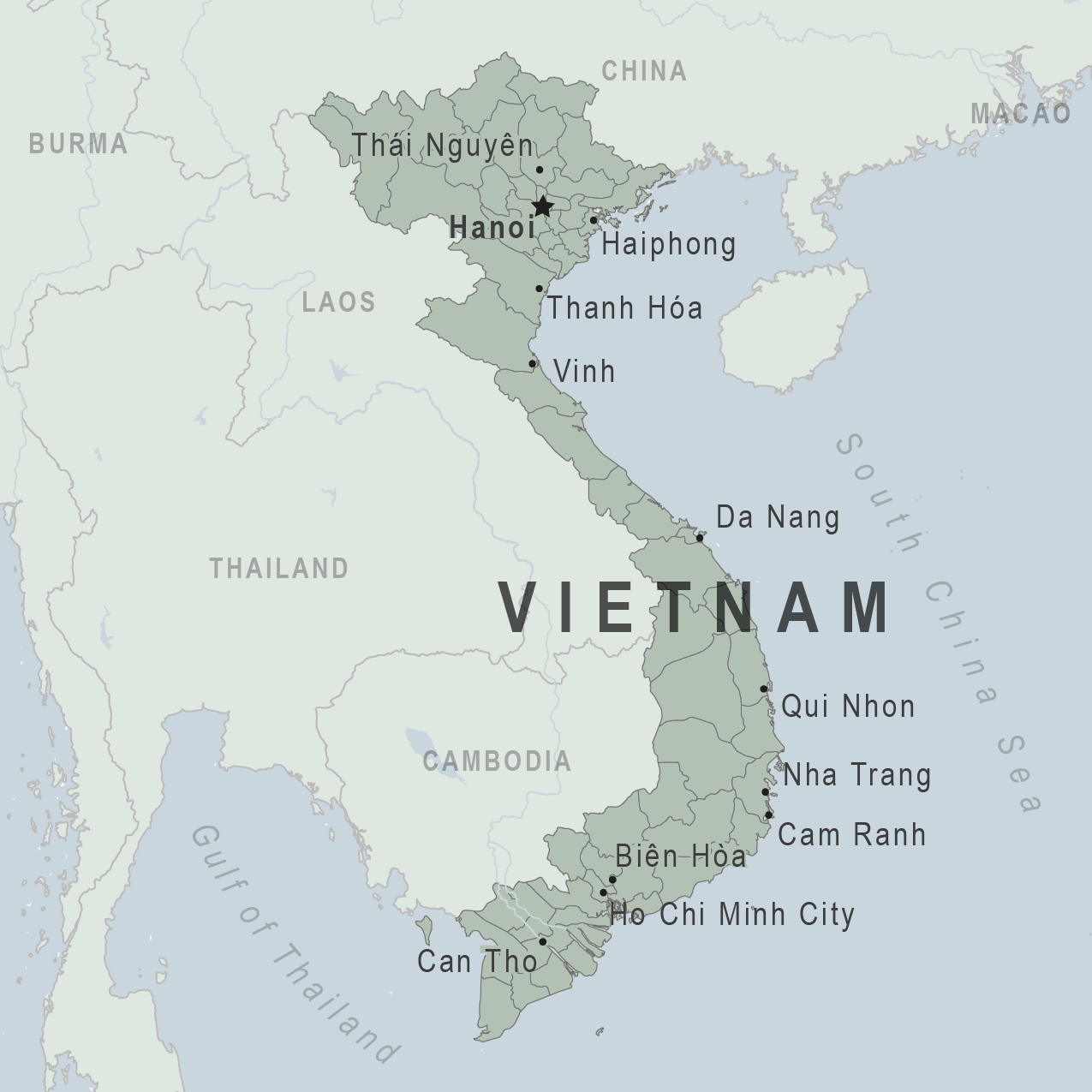
There are no notices currently in effect for Vietnam.
⇧ Top
Check the vaccines and medicines list and visit your doctor at least a month before your trip to get vaccines or medicines you may need. If you or your doctor need help finding a location that provides certain vaccines or medicines, visit the Find a Clinic page.
Routine vaccines
Recommendations.
Make sure you are up-to-date on all routine vaccines before every trip. Some of these vaccines include
- Chickenpox (Varicella)
- Diphtheria-Tetanus-Pertussis
- Flu (influenza)
- Measles-Mumps-Rubella (MMR)
Immunization schedules
All eligible travelers should be up to date with their COVID-19 vaccines. Please see Your COVID-19 Vaccination for more information.
COVID-19 vaccine
Hepatitis A
Recommended for unvaccinated travelers one year old or older going to Vietnam.
Infants 6 to 11 months old should also be vaccinated against Hepatitis A. The dose does not count toward the routine 2-dose series.
Travelers allergic to a vaccine component or who are younger than 6 months should receive a single dose of immune globulin, which provides effective protection for up to 2 months depending on dosage given.
Unvaccinated travelers who are over 40 years old, immunocompromised, or have chronic medical conditions planning to depart to a risk area in less than 2 weeks should get the initial dose of vaccine and at the same appointment receive immune globulin.
Hepatitis A - CDC Yellow Book
Dosing info - Hep A
Hepatitis B
Recommended for unvaccinated travelers of all ages traveling to Vietnam.
Hepatitis B - CDC Yellow Book
Dosing info - Hep B
Japanese Encephalitis
Recommended for travelers who
- Are moving to an area with Japanese encephalitis to live
- Spend long periods of time, such as a month or more, in areas with Japanese encephalitis
- Frequently travel to areas with Japanese encephalitis
Consider vaccination for travelers
- Spending less than a month in areas with Japanese encephalitis but will be doing activities that increase risk of infection, such as visiting rural areas, hiking or camping, or staying in places without air conditioning, screens, or bed nets
- Going to areas with Japanese encephalitis who are uncertain of their activities or how long they will be there
Not recommended for travelers planning short-term travel to urban areas or travel to areas with no clear Japanese encephalitis season.
Japanese encephalitis - CDC Yellow Book
Japanese Encephalitis Vaccine for US Children
CDC recommends that travelers going to certain areas of Vietnam take prescription medicine to prevent malaria. Depending on the medicine you take, you will need to start taking this medicine multiple days before your trip, as well as during and after your trip. Talk to your doctor about which malaria medication you should take.
Find country-specific information about malaria.
Malaria - CDC Yellow Book
Considerations when choosing a drug for malaria prophylaxis (CDC Yellow Book)
Malaria information for Vietnam.
Cases of measles are on the rise worldwide. Travelers are at risk of measles if they have not been fully vaccinated at least two weeks prior to departure, or have not had measles in the past, and travel internationally to areas where measles is spreading.
All international travelers should be fully vaccinated against measles with the measles-mumps-rubella (MMR) vaccine, including an early dose for infants 6–11 months, according to CDC’s measles vaccination recommendations for international travel .
Measles (Rubeola) - CDC Yellow Book
Rabid dogs are commonly found in Vietnam. However, if you are bitten or scratched by a dog or other mammal while in Vietnam, rabies treatment is often available.
Consider rabies vaccination before your trip if your activities mean you will be around dogs or wildlife.
Travelers more likely to encounter rabid animals include
- Campers, adventure travelers, or cave explorers (spelunkers)
- Veterinarians, animal handlers, field biologists, or laboratory workers handling animal specimens
- Visitors to rural areas
Since children are more likely to be bitten or scratched by a dog or other animals, consider rabies vaccination for children traveling to Vietnam.
Rabies - CDC Yellow Book
Recommended for most travelers, especially those staying with friends or relatives or visiting smaller cities or rural areas.
Typhoid - CDC Yellow Book
Dosing info - Typhoid
- Avoid contaminated water
Leptospirosis
How most people get sick (most common modes of transmission)
- Touching urine or other body fluids from an animal infected with leptospirosis
- Swimming or wading in urine-contaminated fresh water, or contact with urine-contaminated mud
- Drinking water or eating food contaminated with animal urine
- Avoid contaminated water and soil
Clinical Guidance
Schistosomiasis
- Wading, swimming, bathing, or washing in contaminated freshwater streams, rivers, ponds, lakes, or untreated pools.
Avoid bug bites
Chikungunya
- Mosquito bite
- Avoid Bug Bites
- Mosquito bite
- An infected pregnant woman can spread it to her unborn baby
Airborne & droplet
Avian/bird flu.
- Being around, touching, or working with infected poultry, such as visiting poultry farms or live-animal markets
- Avoid domestic and wild poultry
- Breathing in air or accidentally eating food contaminated with the urine, droppings, or saliva of infected rodents
- Bite from an infected rodent
- Less commonly, being around someone sick with hantavirus (only occurs with Andes virus)
- Avoid rodents and areas where they live
- Avoid sick people
Tuberculosis (TB)
- Breathe in TB bacteria that is in the air from an infected and contagious person coughing, speaking, or singing.
Learn actions you can take to stay healthy and safe on your trip. Vaccines cannot protect you from many diseases in Vietnam, so your behaviors are important.
Eat and drink safely
Food and water standards around the world vary based on the destination. Standards may also differ within a country and risk may change depending on activity type (e.g., hiking versus business trip). You can learn more about safe food and drink choices when traveling by accessing the resources below.
- Choose Safe Food and Drinks When Traveling
- Water Treatment Options When Hiking, Camping or Traveling
- Global Water, Sanitation and Hygiene | Healthy Water
- Avoid Contaminated Water During Travel
You can also visit the Department of State Country Information Pages for additional information about food and water safety.
Prevent bug bites
Bugs (like mosquitoes, ticks, and fleas) can spread a number of diseases in Vietnam. Many of these diseases cannot be prevented with a vaccine or medicine. You can reduce your risk by taking steps to prevent bug bites.
What can I do to prevent bug bites?
- Cover exposed skin by wearing long-sleeved shirts, long pants, and hats.
- Use an appropriate insect repellent (see below).
- Use permethrin-treated clothing and gear (such as boots, pants, socks, and tents). Do not use permethrin directly on skin.
- Stay and sleep in air-conditioned or screened rooms.
- Use a bed net if the area where you are sleeping is exposed to the outdoors.
What type of insect repellent should I use?
- FOR PROTECTION AGAINST TICKS AND MOSQUITOES: Use a repellent that contains 20% or more DEET for protection that lasts up to several hours.
- Picaridin (also known as KBR 3023, Bayrepel, and icaridin)
- Oil of lemon eucalyptus (OLE) or para-menthane-diol (PMD)
- 2-undecanone
- Always use insect repellent as directed.
What should I do if I am bitten by bugs?
- Avoid scratching bug bites, and apply hydrocortisone cream or calamine lotion to reduce the itching.
- Check your entire body for ticks after outdoor activity. Be sure to remove ticks properly.
What can I do to avoid bed bugs?
Although bed bugs do not carry disease, they are an annoyance. See our information page about avoiding bug bites for some easy tips to avoid them. For more information on bed bugs, see Bed Bugs .
For more detailed information on avoiding bug bites, see Avoid Bug Bites .
Some diseases in Vietnam—such as dengue, Zika, and filariasis—are spread by bugs and cannot be prevented with a vaccine. Follow the insect avoidance measures described above to prevent these and other illnesses.
Stay safe outdoors
If your travel plans in Vietnam include outdoor activities, take these steps to stay safe and healthy during your trip.
- Stay alert to changing weather conditions and adjust your plans if conditions become unsafe.
- Prepare for activities by wearing the right clothes and packing protective items, such as bug spray, sunscreen, and a basic first aid kit.
- Consider learning basic first aid and CPR before travel. Bring a travel health kit with items appropriate for your activities.
- If you are outside for many hours in heat, eat salty snacks and drink water to stay hydrated and replace salt lost through sweating.
- Protect yourself from UV radiation : use sunscreen with an SPF of at least 15, wear protective clothing, and seek shade during the hottest time of day (10 a.m.–4 p.m.).
- Be especially careful during summer months and at high elevation. Because sunlight reflects off snow, sand, and water, sun exposure may be increased during activities like skiing, swimming, and sailing.
- Very cold temperatures can be dangerous. Dress in layers and cover heads, hands, and feet properly if you are visiting a cold location.
Stay safe around water
- Swim only in designated swimming areas. Obey lifeguards and warning flags on beaches.
- Practice safe boating—follow all boating safety laws, do not drink alcohol if driving a boat, and always wear a life jacket.
- Do not dive into shallow water.
- Do not swim in freshwater in developing areas or where sanitation is poor.
- Avoid swallowing water when swimming. Untreated water can carry germs that make you sick.
- To prevent infections, wear shoes on beaches where there may be animal waste.
Leptospirosis, a bacterial infection that can be spread in fresh water, is found in Vietnam. Avoid swimming in fresh, unchlorinated water, such as lakes, ponds, or rivers.
Keep away from animals
Most animals avoid people, but they may attack if they feel threatened, are protecting their young or territory, or if they are injured or ill. Animal bites and scratches can lead to serious diseases such as rabies.
Follow these tips to protect yourself:
- Do not touch or feed any animals you do not know.
- Do not allow animals to lick open wounds, and do not get animal saliva in your eyes or mouth.
- Avoid rodents and their urine and feces.
- Traveling pets should be supervised closely and not allowed to come in contact with local animals.
- If you wake in a room with a bat, seek medical care immediately. Bat bites may be hard to see.
All animals can pose a threat, but be extra careful around dogs, bats, monkeys, sea animals such as jellyfish, and snakes. If you are bitten or scratched by an animal, immediately:
- Wash the wound with soap and clean water.
- Go to a doctor right away.
- Tell your doctor about your injury when you get back to the United States.
Consider buying medical evacuation insurance. Rabies is a deadly disease that must be treated quickly, and treatment may not be available in some countries.
Reduce your exposure to germs
Follow these tips to avoid getting sick or spreading illness to others while traveling:
- Wash your hands often, especially before eating.
- If soap and water aren’t available, clean hands with hand sanitizer (containing at least 60% alcohol).
- Don’t touch your eyes, nose, or mouth. If you need to touch your face, make sure your hands are clean.
- Cover your mouth and nose with a tissue or your sleeve (not your hands) when coughing or sneezing.
- Try to avoid contact with people who are sick.
- If you are sick, stay home or in your hotel room, unless you need medical care.
Avoid sharing body fluids
Diseases can be spread through body fluids, such as saliva, blood, vomit, and semen.
Protect yourself:
- Use latex condoms correctly.
- Do not inject drugs.
- Limit alcohol consumption. People take more risks when intoxicated.
- Do not share needles or any devices that can break the skin. That includes needles for tattoos, piercings, and acupuncture.
- If you receive medical or dental care, make sure the equipment is disinfected or sanitized.
Know how to get medical care while traveling
Plan for how you will get health care during your trip, should the need arise:
- Carry a list of local doctors and hospitals at your destination.
- Review your health insurance plan to determine what medical services it would cover during your trip. Consider purchasing travel health and medical evacuation insurance.
- Carry a card that identifies, in the local language, your blood type, chronic conditions or serious allergies, and the generic names of any medications you take.
- Some prescription drugs may be illegal in other countries. Call Vietnam’s embassy to verify that all of your prescription(s) are legal to bring with you.
- Bring all the medicines (including over-the-counter medicines) you think you might need during your trip, including extra in case of travel delays. Ask your doctor to help you get prescriptions filled early if you need to.
Many foreign hospitals and clinics are accredited by the Joint Commission International. A list of accredited facilities is available at their website ( www.jointcommissioninternational.org ).
In some countries, medicine (prescription and over-the-counter) may be substandard or counterfeit. Bring the medicines you will need from the United States to avoid having to buy them at your destination.
Malaria is a risk in some parts of Vietnam. If you are going to a risk area, fill your malaria prescription before you leave, and take enough with you for the entire length of your trip. Follow your doctor’s instructions for taking the pills; some need to be started before you leave.
Select safe transportation
Motor vehicle crashes are the #1 killer of healthy US citizens in foreign countries.
In many places cars, buses, large trucks, rickshaws, bikes, people on foot, and even animals share the same lanes of traffic, increasing the risk for crashes.
Be smart when you are traveling on foot.
- Use sidewalks and marked crosswalks.
- Pay attention to the traffic around you, especially in crowded areas.
- Remember, people on foot do not always have the right of way in other countries.
Riding/Driving
Choose a safe vehicle.
- Choose official taxis or public transportation, such as trains and buses.
- Ride only in cars that have seatbelts.
- Avoid overcrowded, overloaded, top-heavy buses and minivans.
- Avoid riding on motorcycles or motorbikes, especially motorbike taxis. (Many crashes are caused by inexperienced motorbike drivers.)
- Choose newer vehicles—they may have more safety features, such as airbags, and be more reliable.
- Choose larger vehicles, which may provide more protection in crashes.
Think about the driver.
- Do not drive after drinking alcohol or ride with someone who has been drinking.
- Consider hiring a licensed, trained driver familiar with the area.
- Arrange payment before departing.
Follow basic safety tips.
- Wear a seatbelt at all times.
- Sit in the back seat of cars and taxis.
- When on motorbikes or bicycles, always wear a helmet. (Bring a helmet from home, if needed.)
- Avoid driving at night; street lighting in certain parts of Vietnam may be poor.
- Do not use a cell phone or text while driving (illegal in many countries).
- Travel during daylight hours only, especially in rural areas.
- If you choose to drive a vehicle in Vietnam, learn the local traffic laws and have the proper paperwork.
- Get any driving permits and insurance you may need. Get an International Driving Permit (IDP). Carry the IDP and a US-issued driver's license at all times.
- Check with your auto insurance policy's international coverage, and get more coverage if needed. Make sure you have liability insurance.
- Avoid using local, unscheduled aircraft.
- If possible, fly on larger planes (more than 30 seats); larger airplanes are more likely to have regular safety inspections.
- Try to schedule flights during daylight hours and in good weather.
Medical Evacuation Insurance
If you are seriously injured, emergency care may not be available or may not meet US standards. Trauma care centers are uncommon outside urban areas. Having medical evacuation insurance can be helpful for these reasons.
Helpful Resources
Road Safety Overseas (Information from the US Department of State): Includes tips on driving in other countries, International Driving Permits, auto insurance, and other resources.
The Association for International Road Travel has country-specific Road Travel Reports available for most countries for a minimal fee.
For information traffic safety and road conditions in Vietnam, see Travel and Transportation on US Department of State's country-specific information for Vietnam .
Maintain personal security
Use the same common sense traveling overseas that you would at home, and always stay alert and aware of your surroundings.
Before you leave
- Research your destination(s), including local laws, customs, and culture.
- Monitor travel advisories and alerts and read travel tips from the US Department of State.
- Enroll in the Smart Traveler Enrollment Program (STEP) .
- Leave a copy of your itinerary, contact information, credit cards, and passport with someone at home.
- Pack as light as possible, and leave at home any item you could not replace.
While at your destination(s)
- Carry contact information for the nearest US embassy or consulate .
- Carry a photocopy of your passport and entry stamp; leave the actual passport securely in your hotel.
- Follow all local laws and social customs.
- Do not wear expensive clothing or jewelry.
- Always keep hotel doors locked, and store valuables in secure areas.
- If possible, choose hotel rooms between the 2nd and 6th floors.
To call for emergency services while in Vietnam, dial 115 for an ambulance, 114 for the fire department, and 113 for the police. Write these numbers down to carry with you on your trip.
Learn as much as you can about Vietnam before you travel there. A good place to start is the country-specific information on Vietnam from the US Department of State
Healthy Travel Packing List
Use the Healthy Travel Packing List for Vietnam for a list of health-related items to consider packing for your trip. Talk to your doctor about which items are most important for you.
Why does CDC recommend packing these health-related items?
It’s best to be prepared to prevent and treat common illnesses and injuries. Some supplies and medicines may be difficult to find at your destination, may have different names, or may have different ingredients than what you normally use.
If you are not feeling well after your trip, you may need to see a doctor. If you need help finding a travel medicine specialist, see Find a Clinic . Be sure to tell your doctor about your travel, including where you went and what you did on your trip. Also tell your doctor if you were bitten or scratched by an animal while traveling.
If your doctor prescribed antimalarial medicine for your trip, keep taking the rest of your pills after you return home. If you stop taking your medicine too soon, you could still get sick.
Malaria is always a serious disease and may be a deadly illness. If you become ill with a fever either while traveling in a malaria-risk area or after you return home (for up to 1 year), you should seek immediate medical attention and should tell the doctor about your travel history.
For more information on what to do if you are sick after your trip, see Getting Sick after Travel .
Map Disclaimer - The boundaries and names shown and the designations used on maps do not imply the expression of any opinion whatsoever on the part of the Centers for Disease Control and Prevention concerning the legal status of any country, territory, city or area or of its authorities, or concerning the delimitation of its frontiers or boundaries. Approximate border lines for which there may not yet be full agreement are generally marked.
Other Destinations
If you need help finding travel information:
Message & data rates may apply. CDC Privacy Policy
File Formats Help:
- Adobe PDF file
- Microsoft PowerPoint file
- Microsoft Word file
- Microsoft Excel file
- Audio/Video file
- Apple Quicktime file
- RealPlayer file
- Zip Archive file
Exit Notification / Disclaimer Policy
- The Centers for Disease Control and Prevention (CDC) cannot attest to the accuracy of a non-federal website.
- Linking to a non-federal website does not constitute an endorsement by CDC or any of its employees of the sponsors or the information and products presented on the website.
- You will be subject to the destination website's privacy policy when you follow the link.
- CDC is not responsible for Section 508 compliance (accessibility) on other federal or private website.

Search Smartraveller

Latest update
Exercise normal safety precautions in Vietnam.
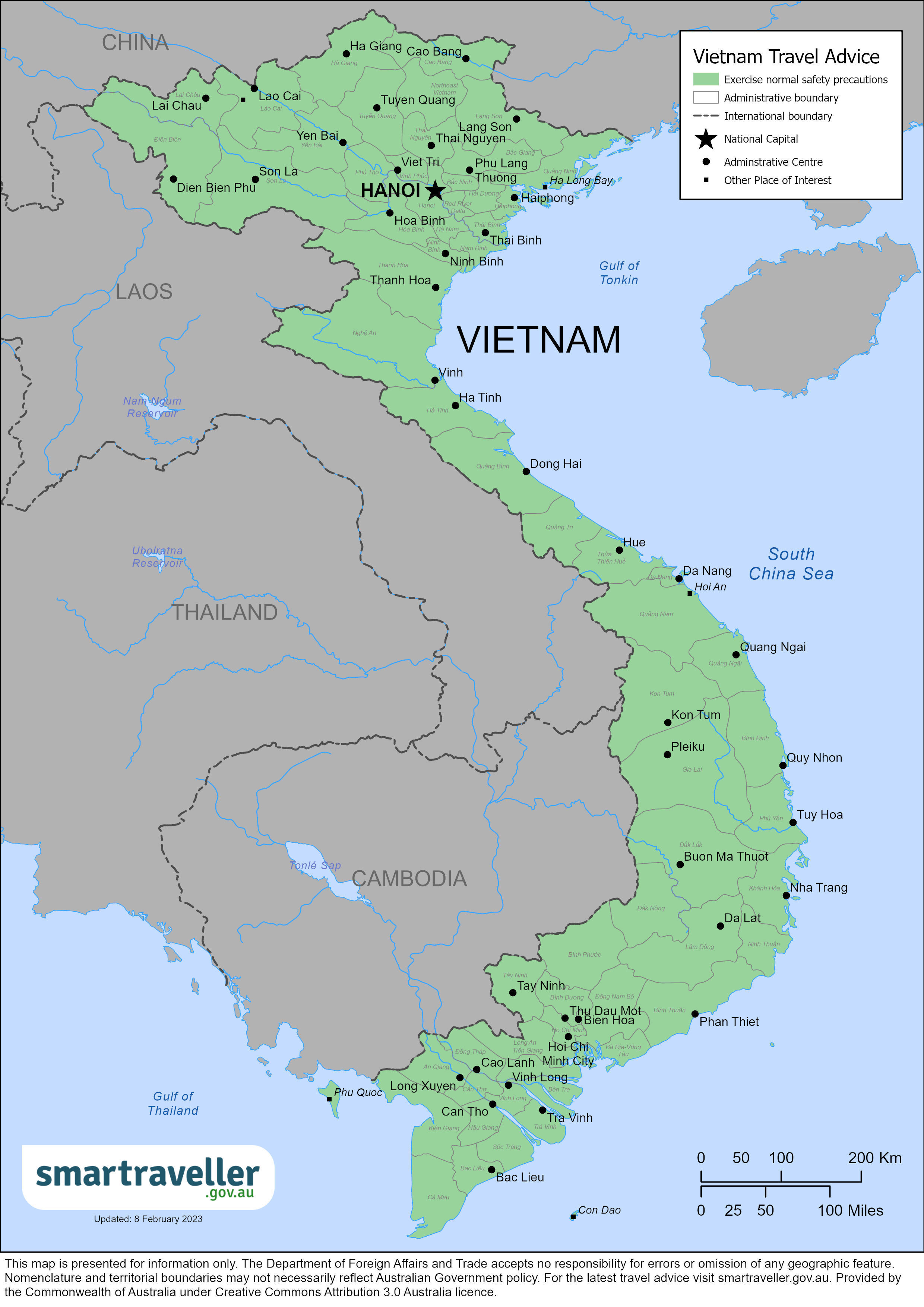
Vietnam (PDF 920.32 KB)
Asia (PDF 2.21 MB)
Local emergency contacts
Fire and rescue services, medical emergencies, advice levels.
Exercise normal safety precautions in Vietnam.
- Road accidents are a major cause of injury. Be alert at all times on the roads.
- Petty theft, including bag slashing, is common in tourist areas and crowded places, especially during holiday times. Snatch-and-grab theft by thieves on motorcycles is also common. Hold bags and backpacks in front of you or on the opposite side to the traffic to make them harder to steal. Be aware of motorbikes approaching as you walk. Carry the minimum amount of valuables. Be prepared to surrender your valuables rather than risk being injured in a struggle.
- Aggravated theft, sexual assault and assault happen. Travellers have been assaulted after having their food or drinks spiked. Pay attention when your drinks are being mixed. Get urgent medical help if you suspect drink spiking.
- Personal or commercial disputes sometimes lead to threats of physical violence or death. Have a clear agreement on the expected level of service. Report any threats to police.
- Travellers have been robbed withdrawing money from ATMs. Credit and debit card fraud and card skimming happen across Vietnam. Taxi and gambling scams are also common. Only use ATMs in banks and shopping centres. Always keep your credit card in sight. Use metered or prearranged taxis, especially at airports. Report gambling scams to police.
- During the rainy season (June to November), floods, typhoons and severe weather can disrupt essential services. Follow the advice of local officials.
Full travel advice: Safety
- Air pollution levels can be high in Vietnam, particularly in large cities.
- Insect-borne diseases such as dengue, Japanese encephalitis, malaria and zika virus are a risk. If you’re pregnant, discuss your travel plans with your doctor. Use insect repellent. Get vaccinated before you travel. Consider taking anti-malarial medication.
- Rabies occurs in Vietnam, especially in the north. It’s fatal without treatment. If you’re bitten or scratched by an animal, get medical help immediately.
- HIV/AIDS is a risk. Take precautions if you’re taking part in high-risk activities.
- Diphtheria is a risk. Ensure your vaccinations are up-to-date.
- Hand, foot and mouth disease (HFMD) is common. It mainly affects children and young adults. Foodborne, waterborne, parasitic and other infectious diseases include cholera, hepatitis and typhoid. Wash your hands well and often. Drink only boiled or bottled water. Avoid raw or undercooked food.
Full travel advice: Health
- Don’t use or carry illegal drugs, including marijuana. Penalties for drug offences include the death penalty and life imprisonment. Never carry parcels or luggage for others.
- Get professional legal advice before signing any contract. If you're in a business or civil dispute, officials could stop you leaving Vietnam until it’s resolved.
- It's illegal to gamble in a non-government licensed casino or possess pornography. Non-state sanctioned political or religious activity or material, or involvement with groups perceived by the Government of Vietnam to be associated with dissident groups, is also illegal.
- It’s illegal to export antiques without a permit. Get a permit from the Ministry of Culture, Sports and Tourism (Vietnamese) . It’s illegal to photograph border areas or military sites. Be careful when taking photos.
- Possessing or distributing images or objects linked to the former Republic of Vietnam, including commemorative or Vietnam War service-related items, is an offence that could attract harsh penalties.
- Vietnam recognises dual nationality in limited situations. If you're a dual national, travel on your Australian passport. You may need to do compulsory military service. Contact your nearest Vietnamese embassy or consulate for details.
Full travel advice: Local laws
- You must have an appropriate visa before travelling to Vietnam. You can apply online for an eVisa for tourism or business purposes. If approved, the eVisa allows for a stay of up to 90 days and is valid for multiple entries. Entry and exit conditions can change at short notice. You should contact the nearest embassy or consulate of Vietnam for the latest details.
- You must check your details are correct when applying for a visa. The visa details must match exactly the information on your passport's biodata page, such as your full name and date of birth. Any errors or name omissions may result in you being refused entry. You may be charged a significant fee at check-in or on arrival to correct the visa error.
- If you're travelling with prescription medication, check the value and quantity restrictions on the import and export of prescription medication with the nearest embassy or consulate of Vietnam .
Full travel advice: Travel
Local contacts
- The Consular Services Charter details what the Australian Government can and can’t do to help you overseas.
- For consular assistance, contact the Australian Embassy in Hanoi , or the Australian Consulate-General in Ho Chi Minh City .
- To stay up to date with local information, follow the Embassy’s social media accounts
Full travel advice: Local contacts
Full advice
Petty crime.
Petty crime, street crime and harassment happen, especially in larger cities.
Bag slashing is common in tourist areas, at markets, on crowded trains and buses, and at supermarkets. It increases in the lead up to and during Vietnamese and Western holiday periods.
Thieves on motorcycles commit snatch-and-grab crimes against pedestrians. This happens often and sometimes results in injury.
Thieves steal valuables, such as jewellery, handbags, mobile phones and cameras.
To protect your belongings:
- take care crossing the street or walking along footpaths
- be aware of motorcycles approaching from behind as you walk on the footpath
- hold bags and backpacks in front of you or in ways that make them harder to snatch
- carry only what you need and leave other valuables in a secure location
- be prepared to surrender your valuables rather than risk being injured in a struggle
Violent crime
Aggravated theft, sexual assault and assault happen. Hot spots include:
- Ho Chi Minh City
- Sapa, especially on the train to and from Lao Cai
- Cat Ba Island, near Ha Long Bay
Reports of groping and other sexual assault are rising.
Drink spiking occurs. Foreigners have been robbed and sexually assaulted after having spiked food and drinks. This happens at late-night establishments in major cities.
To protect yourself from drink spiking:
- only drink alcohol at reputable places
- pay attention when your alcoholic drinks are being mixed
- stay with people you trust in bars and at nightclubs
If you think your drink or a friend's drink has been spiked, get urgent medical attention.
If you're a victim of a violent crime, especially sexual assault, get medical attention. There is a risk of contracting HIV/AIDS, hepatitis and other sexually transmitted diseases in Vietnam.
Although gun violence is uncommon in Vietnam, there have been isolated incidents in recent years.
Travellers have been robbed after withdrawing money from ATMs.
Break-ins to hotels and private homes are reported. This happens even while guests are in their rooms.
To protect yourself from robbery :
- only use ATMs in banks and shopping centres
- make sure your hotel room is locked at all times, including when you're inside
- pay close attention to your personal belongings, especially in crowded areas
- be alert on overnight trains and buses and on quiet stretches of road
Report thefts straight away to the local police and hotel management.
Personal or commercial arguments sometimes lead to threats of physical violence or death.
If you're threatened with violence, report it to local police.
To avoid commercial disputes, have a clear agreement on what the expected level of service is.
Many travellers have become victims of credit and debit card, taxi and gambling scams .
Credit and debit card skimming is where card data is taken for use in fraudulent transactions. This happens throughout Vietnam.
Some Australians have lost thousands of dollars after accepting invitations to private homes from friendly locals. Beware of rigged card games and other confidence tricks organised by criminals.
Gambling may break local laws, which also apply to travellers. See Laws .
To avoid credit and debit card scams:
- keep your credit card in sight at all times
- don't share or show your PIN to others, especially when using ATMs
- check your transaction statements
At airports, use airport taxis, prearranged hotel transfer services, taxis from clearly marked taxi ranks with staff, or one reserved through a car booking app.
Check that any person holding a placard with your name on it knows where you are going.
Be careful of people who are overly friendly and invite you to their home.
If you're a victim of a gambling scam, report it to local police.
Cyber security
You may be at risk of cyber-based threats during overseas travel to any country. Digital identity theft is a growing concern. Your devices and personal data can be compromised, especially if you're connecting to Wi-Fi, using or connecting to shared or public computers, or to Bluetooth.
Social media can also be risky in destinations where there are social or political tensions or laws that may seem unreasonable by Australian standards. Travellers have been arrested for things they have said on social media. Don't comment on local or political events on your social media.
More information:
- Cyber security when travelling overseas
Kidnapping can happen anywhere, anytime, including in destinations that are typically at low risk.
The Australian Government's longstanding policy is that it doesn't make payments or concessions to kidnappers.
More information:
Civil unrest and political tension
Although rare, protests sometimes happen.
Don't take photos of demonstrations, the military or the police. Authorities may not tolerate this.
Some localised violent clashes between protesters and police have resulted in casualties. The most recent incident occurred in Đắk Lắk Province in June 2023, when several police were killed in organised attacks on police stations.
Public protests and events that draw large groups of people can turn violent.
Demonstrations and civil unrest
Terrorism is a threat worldwide.
Tours and adventure activities
Transport and tour operators' safety and maintenance standards may not meet your expectations. This can include adventure activities, such as mountain climbing and boat trips.
If you plan to do an adventure activity :
- check if your travel insurance policy covers it
- ask about and insist on minimum safety requirements
- always use available safety gear, such as life jackets or seatbelts
If proper safety equipment isn't available, use another provider.
Climate and natural disasters
Vietnam experiences natural disasters and severe weather , including:
- flash floods
Severe weather events can disrupt air, sea, road and rail transport, electricity and communications.
If there's a natural disaster:
- always carry your passport in a waterproof bag
- keep in regular touch with family and friends
- check the media and other local sources for information
- follow the advice of local authorities
Global Disaster Alert and Coordination System
Flooding and typhoons
Floods , flash floods, typhoons and severe weather are common during the rainy season, from June to November.
Flooding can lead to landslides including in built up and residential areas of towns and villages.
Typhoons mostly affect the coastal areas of the north and central regions. Though less common, typhoons also happen in the south.
Monitor the media, and weather and flood level reports during the rainy season.
The Mekong River Commission gives information on flood levels for the Mekong River region.
If there's a flood, typhoon or severe weather:
- don't enter the affected areas without getting advice from local authorities
- check with tour operators before travelling to affected areas
- if in doubt about the safety of any location, change your travel plans.
Large, frequent earthquakes in the region make destructive tsunamis more likely.
Be alert to warnings. A tsunami can arrive within minutes of a nearby tremor or earthquake.
To receive tsunami alerts, register with the Global Disaster Alert and Coordination System .
Move immediately to high ground if advised by local authorities or if you:
- feel a strong earthquake that makes it hard to stand up
- feel a weak, rolling earthquake that lasts a minute or more
- see a sudden rise or fall in sea level
- hear loud and unusual noises from the sea
Do not wait for official warnings. Once on high ground, monitor local media.
If there's a tsunami or if a tsunami warning is current, check the US Tsunami Warning System .
Travel insurance
Get comprehensive travel insurance before you leave.
Your policy needs to cover all overseas medical costs, including medical evacuation. The Australian Government won’t pay for these costs.
If you can't afford travel insurance, you can't afford to travel. This applies to everyone, no matter how healthy and fit you are.
If you're not insured, you may have to pay many thousands of dollars up-front for medical care.
- what activities and care your policy covers
- that your insurance covers you for the whole time you’ll be away
Physical and mental health
See your doctor or travel clinic to:
- have a basic health check-up
- ask if your travel plans may affect your health
- plan any vaccinations you need
Do this at least 8 weeks before you leave.
If you have immediate concerns for your welfare, or the welfare of another Australian, call the 24-hour Consular Emergency Centre on +61 2 6261 3305 or contact your nearest Australian Embassy, High Commission or Consulate to discuss counselling hotlines and services available in your location.
- General health advice
- Healthy holiday tips (Healthdirect Australia)
Not all medication available over the counter or by prescription in Australia is available in other countries. Some may even be considered illegal or a controlled substance, even if prescribed by an Australian doctor.
Some addictive and psychotropic medications are controlled.
If you plan to take medication, check if it's legal in Vietnam. Take enough legal medicine for your trip and always carry it in its original packaging.
If you are travelling with prescription medication, check the value and quantity restrictions on the import and export of prescription medication with the nearest embassy or consulate of Vietnam .
Carry a copy of your prescription or a letter from your doctor stating:
- what the medication is
- your required dosage
- that it's for personal use
Health risks
Localised outbreaks of diphtheria can occur in Vietnam.
Seek medical advice to en sure your vaccinations are up-to-date.
- Diphtheria (HealthDirect)
Insect-borne illnesses
Zika virus continues to be a risk. There's no vaccination for it.
If you're pregnant, the Australian Department of Health recommends you:
discuss any travel plans with your doctor
consider deferring non-essential travel to affected areas
Dengue is found, especially in the south. There's no vaccine or treatment.
Japanese encephalitis is also found. To protect yourself, consider getting vaccinated. A vaccine is available in Australia.
Malaria is a risk in some remote mountainous areas.
To protect yourself from disease:
- make sure your accommodation is insect proof
- use insect repellent
- wear long, loose, light-coloured clothing
- consider taking medicine to prevent malaria
Discuss your travel plans and other vaccination needs with your doctor before you travel.
Infectious diseases
Rabies is potentially fatal if you don't get vaccinated or receive quick treatment.
Rabies is found in infected dogs, monkeys, bats and other mammals.
Most reported cases are in the mountain areas of northern Vietnam. It's most commonly passed on through dog bites.
To reduce your risk of rabies, don't go near dogs and other mammals.
If you're bitten or scratched, seek medical help immediately.
HIV/AIDS is a risk.
Take precautions if you engage in activities that expose you to risk of infection.
Hand, foot and mouth disease
Hand, foot and mouth disease (HFMD) is common. Sometimes more serious outbreaks happen.
Outbreaks usually peak from March to May and from September to December.
HFMD mostly affects children under the age of 10 years. Adult cases, especially young adults, are not unusual.
The illness appears as a fever, blisters and rashes on the hands, feet and buttocks.
HFMD is spread by direct contact with nose and throat discharges and faeces of infected people.
To reduce the risk of getting or passing on HFMD, pay close attention to hygiene. Wash your hands well and often.
Bird flu (avian influenza)
Human cases of avian influenza or 'bird flu' are reported in Vietnam.
Cholera and other health risks
Acute watery diarrhoea and cholera occur.
Waterborne, foodborne, parasitic and other infectious diseases occur. These include:
- tuberculosis
Serious outbreaks sometimes occur.
To protect yourself from illness:
- drink boiled water or bottled water with sealed lids
- avoid ice cubes
- avoid uncooked and undercooked food, such as salads
Get urgent medical attention if you have a fever or diarrhoea or you suspect food poisoning.
Air pollution
There can be high levels of air pollution, up to and including hazardous levels, in major cities, especially during January to March. Pollution can increase the risk of breathing problems. People with pre-existing medical conditions, particularly heart and lung conditions, may be affected.
If you're concerned about the levels of air pollution:
- seek medical advice
- follow advice from local authorities about methods to reduce exposure
- monitor an air quality index
- reduce your exposure
World Air Quality
Drug use has been reported to cause psychotic episodes and hospitalisation.
If you use drugs in Vietnam, you face possible health and legal risks. See Local laws
Medical care
Medical facilities.
The standard of medical facilities and care varies, is generally below Australian standards, and may lack medicine and supplies.
Foreign private medical clinics are available in Hanoi, Ho Chi Minh City and Da Nang. They may not meet Australian standards.
Medical facilities and care at most public hospitals are poor. This is especially true outside Hanoi and Ho Chi Minh City.
You may need medical evacuation to a major centre, even for minor operations.
Doctors and hospitals expect payment before providing medical services, including for emergency care.
Some hospitals may talk with your travel insurance company to secure payment. Others may need up-front payment before they will start treating you.
If you become seriously ill or injured, you may need to be evacuated to Bangkok or Singapore. Medical evacuation can be very expensive.
You may need to show a legalised birth certificate to be recognised as next of kin for medical consent purposes.
You're subject to all local laws and penalties, including those that may appear harsh by Australian standards. Research local laws before travelling.
If you're arrested or jailed, the Australian Government will do what it can to help you under our Consular Services Charter . But we can't get you out of trouble or out of jail.
Vietnamese authorities have broad powers to implement various measures to contain COVID-19. These include movement restrictions and mandatory isolation for positive cases. These can vary from province to province. Follow the advice of local authorities.
There are strict security and investigative measures to stop drug trafficking.
Penalties for all types of drug offences, including those with small amounts of drugs, are severe. Many drug offences attract the death penalty or life in jail.
Marijuana in any form is illegal.
More than 20 Australians are serving sentences for drug offences in Vietnam. More have been arrested and are waiting for further investigation or trials.
Never carry parcels or luggage for others.
For information about carrying prescription medications into Vietnam, see Travel .
Carrying or using drugs
Marriage laws
Foreigners who want to marry a Vietnamese citizen in Vietnam must get formal approval from the Department of Justice. This must be done in the province where the Vietnamese citizen is registered.
You also need a Certificate of No Impediment to Marriage (CNI) if you plan to marry in Vietnam.
Apply for a CNI through the:
- Australian Embassy in Hanoi
- Australian Consulate-General in Ho Chi Minh City
You can also apply for the CNI from DFAT in Australia. Fees apply. The embassy or consulate of Vietnam in Australia needs to authenticate it. Only then will the Department of Justice in Vietnam recognise it.
Getting married
Business laws
Increased Australian business activity has resulted in a higher number of commercial disputes in recent years.
If you're thinking about entering into a contract, get professional legal advice.
If you're involved in a business or civil dispute, authorities could stop you from leaving Vietnam until you resolve the matter.
- Doing business
- Doing business in Vietnam
- Living or working overseas
Disputes over alleged misrepresentation of working and living conditions for Australians working in Vietnam often happen. This is especially the case for people teaching English.
Before signing an employment contract or travelling to Vietnam for work, verify the true nature of the work you're offered.
Check for unacceptable employment conditions. For example, conditions for early termination may state that you surrender your right to a return air ticket. Your potential employer may also withhold your pay.
To safeguard your stay, also:
- check the living arrangements your potential employer has offered
- make sure you have the correct visa before arriving — ask an embassy or consulate of Vietnam
- get professional legal advice before signing any contract
- get all the work permits you need
The Australian embassy or consulate-general can provide a limited range of notarial services for some documents needed for a work permit.
Never hand over your passport to your employer, even for safekeeping. Reputable businesses won't ask you to hand over your passport.
Make sure you keep a valid visa and work permit. If you don't, authorities will fine you and could detain you.
Going overseas to live or work
Penalties for serious crime, such as rape, espionage and hijacking, may include the death penalty.
It's illegal to:
- take photos at border crossings or military installations
- go too close to the border with China, Cambodia or Laos without prior written permission from the local authorities
- gamble, except in government-licensed casinos where foreign passport holders can gamble
- possess pornography
- possess non-state sanctioned political or religious material
These activities may result in arrest and imprisonment.
Taking part in unsanctioned religious activities, including online, is against the law. Any involvement with non-state sanctioned political organisations, or groups perceived by the Government of Vietnam to be associated with dissident groups is also illegal. If authorities suspect you of involvement in these activities, they could stop you from entering the country, detain or deport you. Authorities could also stop you from leaving, place you under surveillance or subject you to interrogation until an investigation has been completed.
It's illegal to export antiques without a permit. The Ministry of Culture, Sports and Tourism (Vietnamese) offers advice and necessary permits.
Possessing or distributing images or objects linked to the former Republic of Vietnam, including commemorative or Vietnam War service-related items, is an offence that could attract harsh penalties.
Embassy or consulate of Vietnam
Australian laws
Some Australian criminal laws still apply when you’re overseas. If you break these laws, you may face prosecution in Australia.
Staying within the law
Local customs
Same-sex relationships are legal. However, social and cultural attitudes towards same-sex relationships can be conservative, especially in rural areas.
Avoid public displays of affection.
Same-sex partners aren't legally protected or recognised.
Advice for LGBTQIA+ travellers
Dual citizenship
Vietnam recognises dual nationality in limited situations.
If you're a dual citizen and you enter Vietnam on a Vietnamese passport, this limits the consular services we can give if you're arrested or detained. Vietnamese authorities may not tell us of your situation.
Always travel on your Australian passport .
Australian citizens must re-enter Australia on an Australian passport.
If you're a dual national, you may need to do compulsory military service in Vietnam.
Contact the nearest embassy or consulate of Vietnam in Australia before you travel.
Advice for dual nationals
Visas and border measures
Every country or territory decides who can enter or leave through its borders. For specific information about the evidence you'll need to enter a foreign destination, check with the nearest embassy, consulate or immigration department of the destination you're entering.
To enter Vietnam, you must have either a:
- visa exemption certificate
Australian passport holders are not able to obtain visas on arrival in Vietnam.
Learn more about visa requirements.
You can now apply for an eVisa for tourism or business purposes. It allows eligible travellers to stay up to 90 days in Vietnam if granted. The eVisa is valid for single or multiple entries.
You can complete the visa application form online. As there have been reports of difficulties in accessing eVisas during airport check-in, once granted, you should consider printing a hard copy of the visa approval document.
Make sure you enter your details correctly when applying for a visa. The visa details must match exactly the information on your passport's biodata page, such as your full name and date of birth details. When you're issued a visa to enter Vietnam, check that all your Vietnam visa details are correct, match the information in your passport, that your full name is listed, and that there are no spelling or other errors. Any errors or name omissions may result in you being refused entry, or you could be charged a significant fee at check-in or on arrival to correct the visa error.
For stays longer than 90 days, please contact the nearest embassy or consulate of Vietnam.
If your visa expires or is no longer valid, you may be detained and/or fined when leaving.
The Australian Government cannot sponsor your visa application or extension.
Entry and exit conditions can change at short notice. Contact the nearest embassy or consulate of Vietnam for details about visas, currency, customs and quarantine rules.
You must register your place of residence with local police within 24 hours of arrival. Check that your hotel does this as part of the check-in process. Register at the local police station if you're staying in private accommodation.
Travellers have been scammed by private online visa services and travel agents.
Only apply for your visa through the Government of Vietnam’s official website or offices.
Vietnamese spouse or parent visas
If your spouse or parent is a Vietnamese national, you can apply for a visa exemption certificate.
Changes to visa status and visa extensions
You can't change the status of your entry visa to any other visa type in Vietnam. For example, you can't change a tourist or a spouse visa to a working visa.
Vietnam does not issue automatic visa extensions. If your visa has expired, contact the Vietnamese immigration authorities to make arrangements to exit Vietnam. Visa extensions are only possible before your visa expiry date.
To get a visa extension from the Vietnamese immigration authorities, your passport must have at least 6 months validity left at the time of application.
This requirement is subject to change.
Check with the nearest embassy or consulate of Vietnam for details.
Border measures
Travel and entry requirements may change rapidly. Contact your nearest Vietnamese Embassy or Consulate for details on entry and exit requirements.
Other formalities
Import and export of prescription medication .
Medication and medical equipment
Register place of residence
All foreigners must register their place of residence with the local police within 24 hours of arrival.
The Australian embassy and consulate can't provide translation services to help with registration.
If you stay at a hotel, check that you'll be registered as part of the normal check-in process. They'll need your passport details.
Many hotels ask foreigners to leave their passport with hotel staff for registration purposes. It isn't a legal requirement for hotels to keep your passport for the time you stay there.
If you stay with family, friends or in another private residence, you need to register at the local police station. Use a translator if needed.
Local hosts need to pre-register foreign guests. If you stay in a private residence, make sure your host has followed this legal requirement.
Some countries won’t let you enter unless your passport is valid for 6 months after you plan to leave that country. This can apply even if you’re just transiting or stopping over.
Some foreign governments and airlines apply the rule inconsistently. Travellers can receive conflicting advice from different sources.
You can end up stranded if your passport is not valid for more than 6 months.
The Australian Government does not set these rules. Check your passport’s expiry date before you travel. If you’re not sure it’ll be valid for long enough, consider getting a new passport .
Lost and stolen passport
Your passport is a valuable document. It's attractive to people who may try to use your identity to commit crimes.
Some people may try to trick you into giving them your passport. Always keep it in a safe place.
Keep a photocopy (or photograph) of your passport bio page and visa somewhere separately in case you lose your passport.
If your passport is lost or stolen, tell the Australian Government as soon as possible:
- In Australia, contact the Australian Passport Information Service .
- If you're overseas, contact the nearest Australian embassy or consulate .
Passport with 'X' gender identifier
Although Australian passports comply with international standards for sex and gender, we can't guarantee that a passport showing 'X' in the sex field will be accepted for entry or transit by another country. Contact the nearest embassy, high commission or consulate of your destination before you arrive at the border to confirm if authorities will accept passports with 'X' gender markers.
- LGBTQIA+ travellers
The currency of Vietnam is the Vietnamese Dong (VND).
When you arrive or exit Vietnam, declare:
- foreign currency in excess of $US5,000, including cash and traveller's cheques
- more than 15 million Vietnamese dong
If you carry more currency or gold than you declared, authorities could confiscate it. They could arrest or fine you.
These requirements may be subject to change. Contact the nearest embassy or consulate of Vietnam for details.
Credit cards are widely accepted throughout major cities in Vietnam.
ATMs are widespread in Hanoi, Ho Chi Minh City and Da Nang.
Check with your bank to confirm if your ATM (eftpos) card will work in Vietnam.
Card skimming happens throughout Vietnam. See Safety .
You may have trouble getting replacement ATM cards.
Many Australian banks don't have local or regional branches with English-speaking staff.
The Vietnamese postal services are generally unreliable. If you need a new card, consider using an international courier service. The Australian embassy or consulate can't help you with money while you wait for a new card. It can't act as a personal mail-holding service.
Local travel
Travel is restricted:
- in some parts of the central Highlands
- around some border areas
- near military installations
Long Tan Cross site
The Vietnamese Government won't permit official Long Tan commemorations at the Long Tan Cross site in Ba Ria-Vung Tau Province.
Access to the site will remain open to small groups of people for private visits without media coverage. This may change at short notice.
Visitors to the site may not:
- wear medals or uniforms
- carry banners or flags
You must behave in a solemn manner, respecting the wishes of local communities.
Landmines and explosive remnants of war
Unexploded ordinance and landmines are a danger in former battlefields, especially in central Vietnam and along the Laos border.
Mine-free roads and paths are well-marked.
If you visit former battlefields, stay on marked pathways.
Driving permit
You must have a valid Vietnamese driver's licence to drive or ride in Vietnam. This includes for motorcycles of 50cc or more.
An International Driving Permit (IDP) issued in Australia is not recognised in Vietnam.
Authorities may fine you for driving without a valid licence.
Your travel insurer will likely deny any claims you make if:
- You're unlicensed and/or
- You don't hold the correct class of licence.
Australian embassy, Hanoi
Road travel
You're more likely to die in a motor vehicle accident in Vietnam than in Australia.
Hazards include:
- crowded streets in major cities
- drivers ignoring road rules
- poor vehicle and road maintenance
Traffic accidents often happen and attract large crowds.
If you're involved in an accident, you could face criminal charges. This is regardless of who's at fault. You may need to pay a large sum to the injured person or their family.
If you're not familiar with local conditions, avoid driving or riding a motorcycle.
Whether driving, riding or walking, be very careful when crossing busy streets. Traffic can appear from any direction.
Road Safety
Motorcycles
The number of travellers involved in serious motorcycle accidents is increasing.
Check your travel insurance policy covers you when travelling by motorcycle.
Always wear a helmet that meets Australian safety standards.
Only ride motorcycles if you're:
- properly licensed (Australian driver licences or International Driver Licences issued in Australia are not accepted in Vietnam; you must hold a Vietnamese driving licence to ride a motorbike 50cc or above); and
- familiar with and comfortable in local driving conditions
Be careful using taxis hailed on the street.
Major metered taxis are generally reliable. Ensure the taxi driver knows how to get to where you're going before you get in.
Check the meter is used. Leave the taxi if the driver tries to pick other passengers up.
If you book a taxi online or through an app, make sure the details of the vehicle and driver match those the company gives you.
Unless using an Australian safety standard-approved helmet, we discourage using motorcycle taxis as they provide riders with helmets that offer little to no protection against injury in the case of an accident.
Be careful of taxi scams. See Safety
Public transport
Inter-city buses have a high accident rate.
Petty theft often happens on buses. See Safety .
When travelling by rail, keep the ticket stub as you need it when leaving the train station.
Getting around
Boats, hydrofoils and ferries may not meet Australian safety standards.
Accidents on waterways happen. Vessels have sunk and people have died. This includes in Ha Long Bay.
Whenever you plan to travel by boat :
- ask tour operators about the safety record and emergency procedures
- make sure there is enough safety equipment such as life jackets on board
- if proper equipment is not available, use another provider
Piracy happens in coastal areas of Vietnam.
- Reducing the risk of piracy
- International Maritime Bureau piracy reports
You may need to show your luggage tags when leaving a Vietnamese airport. Keep your luggage receipt from your airline on you at all times.
By law, children under 14 years travelling alone on domestic flights must:
- bring a birth certificate
- have an authorisation letter between the legal guardian of the child and the airline confirming the child can travel alone
Contact the airline in advance to check what is needed for unaccompanied minors.
DFAT doesn’t provide information on the safety of individual commercial airlines or flight paths.
Check Vietnam's air safety profile with the Aviation Safety Network.
Travelling by air
Emergencies
Depending on what you need, contact your:
- family and friends
- travel agent
- insurance provider
Emergency numbers in Vietnam are operated in Vietnamese only and may be unreliable. You may have a long wait before emergency services arrive.
Always get a police report when you report a crime.
Take a translator with you to report a crime to the local police. Cases reported by foreigners may be accepted at the discretion of local police.
Your insurer should have a 24-hour emergency number.
Consular contacts
Read the Consular Services Charter for what the Australian Government can and can’t do to help you overseas.
For consular assistance, contact the nearest embassy or consulate.
Australian Embassy, Hanoi
8 Dao Tan Street
Ba Dinh District, Hanoi, Vietnam
Phone: (+84 24) 3774 0100
Website: vietnam.embassy.gov.au
Facebook: Australia in Vietnam
X: @AusAmbVN
Australian Consulate-General, Ho Chi Minh City
20th Floor, Vincom Centre
47 Ly Tu Trong Street
Ben Nghe Ward, District 1
Ho Chi Minh City, Vietnam
Phone: (+84 28) 3521 8100
Website: hcmc.vietnam.embassy.gov.au
Check the relevant website for details about opening hours, and any temporary closures.
24-hour Consular Emergency Centre
In a consular emergency, if you can't contact an embassy, call the 24-hour Consular Emergency Centre on:
- +61 2 6261 3305 from overseas
- 1300 555 135 in Australia

Travelling to Vietnam?
Sign up to get the latest travel advice updates..
Be the first to know official government advice when travelling.
Security Alert May 17, 2024
Worldwide caution, update may 10, 2024, information for u.s. citizens in the middle east.
- Travel Advisories |
- Contact Us |
- MyTravelGov |
Find U.S. Embassies & Consulates
Travel.state.gov, congressional liaison, special issuance agency, u.s. passports, international travel, intercountry adoption, international parental child abduction, records and authentications, popular links, travel advisories, mytravelgov, stay connected, legal resources, legal information, info for u.s. law enforcement, replace or certify documents.
Share this page:
Learn about your destination
Take 90 seconds for safer travel.
Travel Advisory Levels
Enroll in step.

Subscribe to get up-to-date safety and security information and help us reach you in an emergency abroad.
Recommended Web Browsers: Microsoft Edge or Google Chrome.
External Link
You are about to leave travel.state.gov for an external website that is not maintained by the U.S. Department of State.
Links to external websites are provided as a convenience and should not be construed as an endorsement by the U.S. Department of State of the views or products contained therein. If you wish to remain on travel.state.gov, click the "cancel" message.
You are about to visit:
We’re sorry, this site is currently experiencing technical difficulties. Please try again in a few moments. Exception: request blocked
You are using an outdated browser. Please upgrade your browser to improve your experience.
Live fully in Vietnam
Vietnam opens its door widely to welcome visitors all around the world! Starting from 15th August 2023, Vietnam extends e-visa validity to 90 days and unilateral visa exemption will be valid in 45 days! We are more than happy to welcome you all here and admire our stunning landscapes, free your soul on white sandy beaches, experience our unique and beautiful culture and meet the people in the most friendly country. Particularly, to indulge in our scrumptious cuisine at Michelin rated restaurants or to join us in outstanding mega culture, music, sports and tourism events! Let’s live to the fullest in Vietnam!
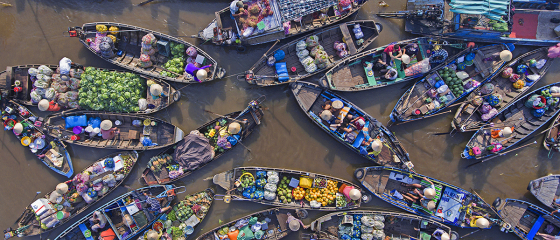
City Breaks
Can Tho: A glimpse of river and garden
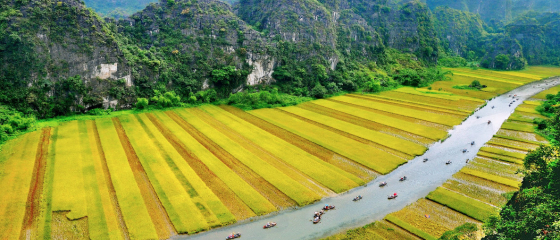
Virtual travel to Trang An Landscape Complex
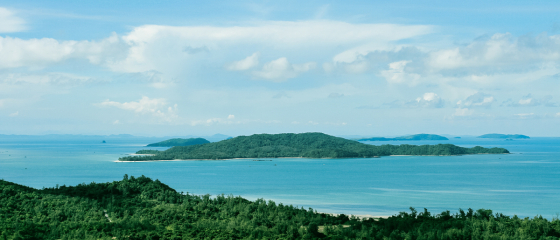
Go green in Co To
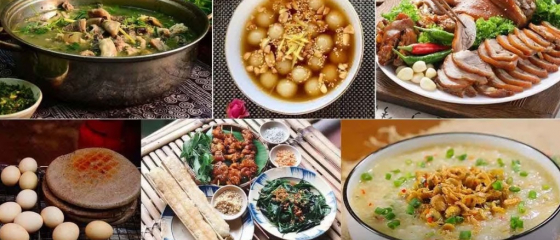
Local unpacked: One of a kind cuisine of Ha Giang karst plateau
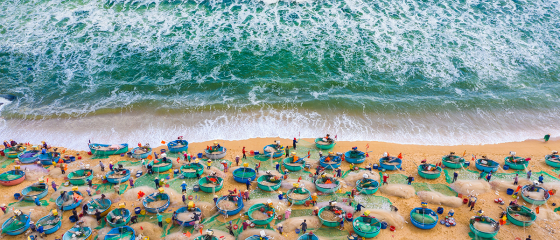
Special daily tours at the Grand Prix of Binh Dinh 2024
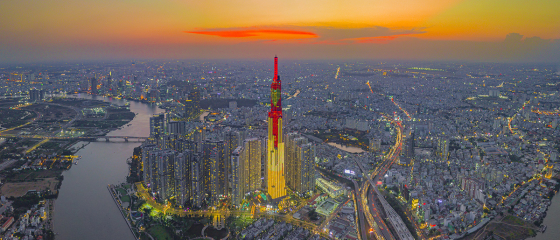
10 Tourist spots not to be missed in Ho Chi Minh City
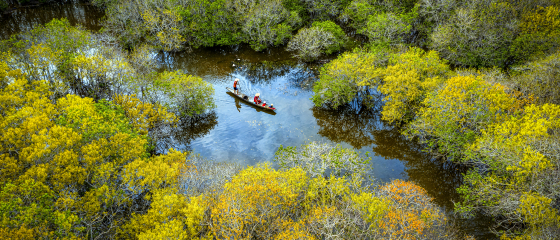
Ru Cha Mangrove Forest: A sleeping beauty of Hue
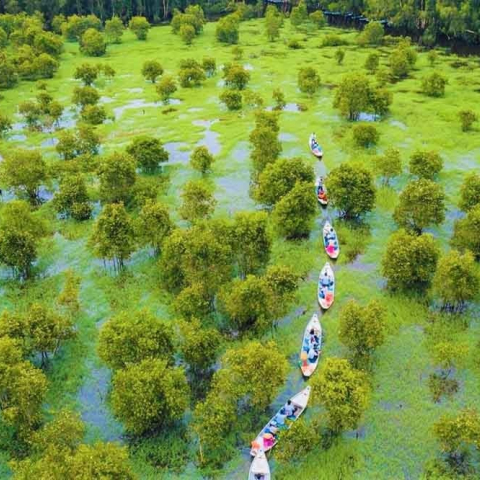
Lost in green wonderland in Tra Su Cajuput Forest
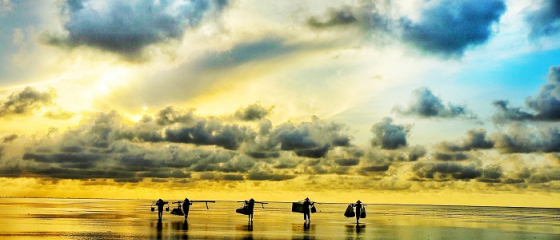
The infinity waters of Quang Lang Beach

Halong Bay - Cat Ba inter-provincial World Heritage Site: Trending destination in Vietnam
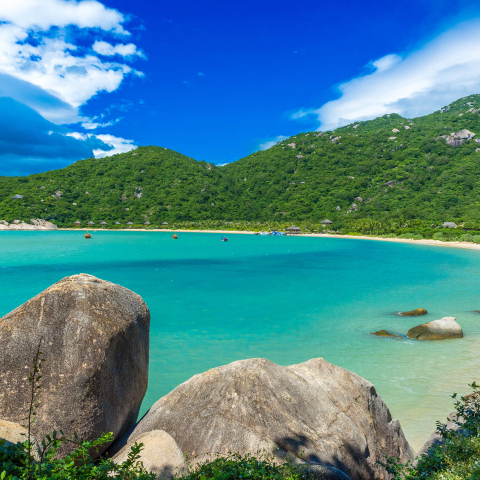
Nha Trang Best Beaches for a Sustainable Vacation
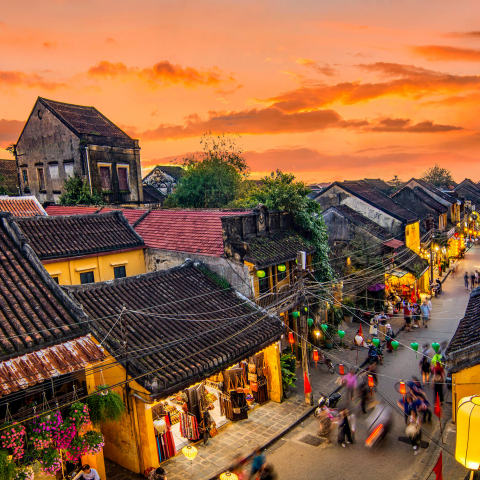
Explore the food of Hoi An
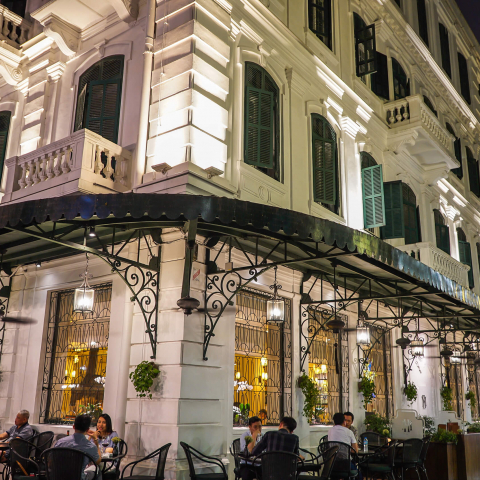
Comfort Meets Culture at Hanoi's Luxury Hotels

Outdoor & Recreational
Binh Dinh - a hot spot for festival goers in 2024

Enjoy the "Fast & Furious" F1H2O World Championship in Binh Dinh
Check out upcoming events in Vietnam
must-see sites
Take a 360-degree tour of some of the country's most compelling natural wonders and cultural attractions right here.
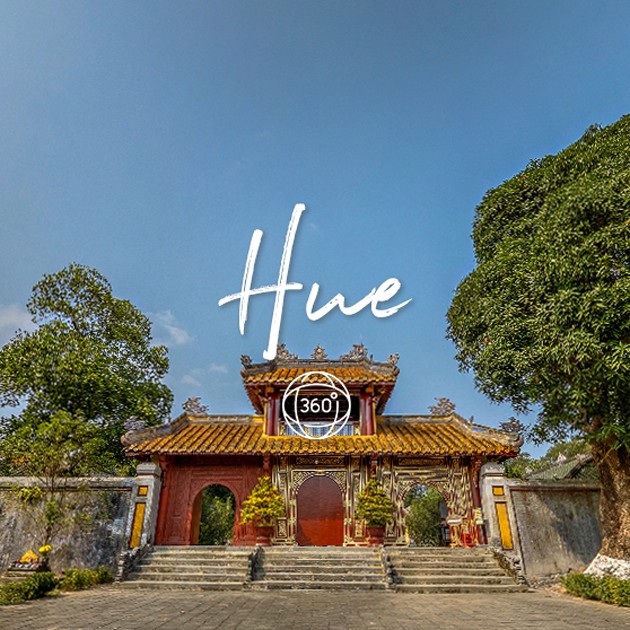
travel tips
Prepare for your trip with these practical articles
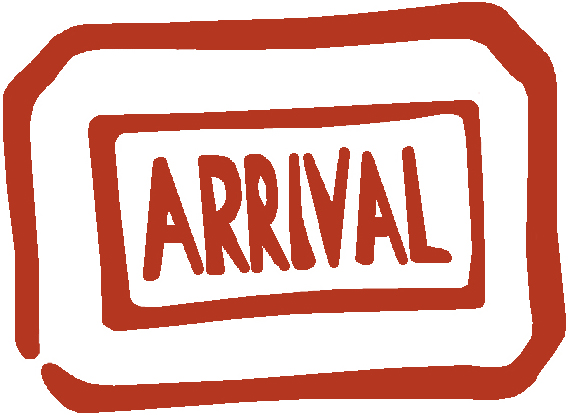
Vietnam through the lens of international news
Find out the reasons why Vietnam is worth to visit

TasteAtlas food rankings are based on the ratings of the TasteAtlas audience, with a series of mechanisms that recognize real users and that ignore bot, nationalist or local patriotic ratings, and give additional value to the ratings of users that the system recognizes as knowledgeable….
- TasteAtlas
Full article

Booking.com
Spring has finally arrived, bringing with it the perfect opportunity to venture out and explore the world.
- Booking.com

Travel Weekly
Visiting the South-East Asian country reminds Thompson Travel’s Sharon Thompson of the wonders of travel…
- Travel Weekly
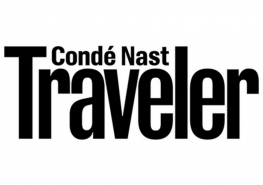
Conde Nast Traveler
To get you started on your next fairy tale adventure, we’ve rounded up 50 of the most beautiful small towns in the world.
- Conde Nast Traveler
share your story
Tag your best #LiveFullyinVietnam moments on Instagram
SHARE YOUR STORY
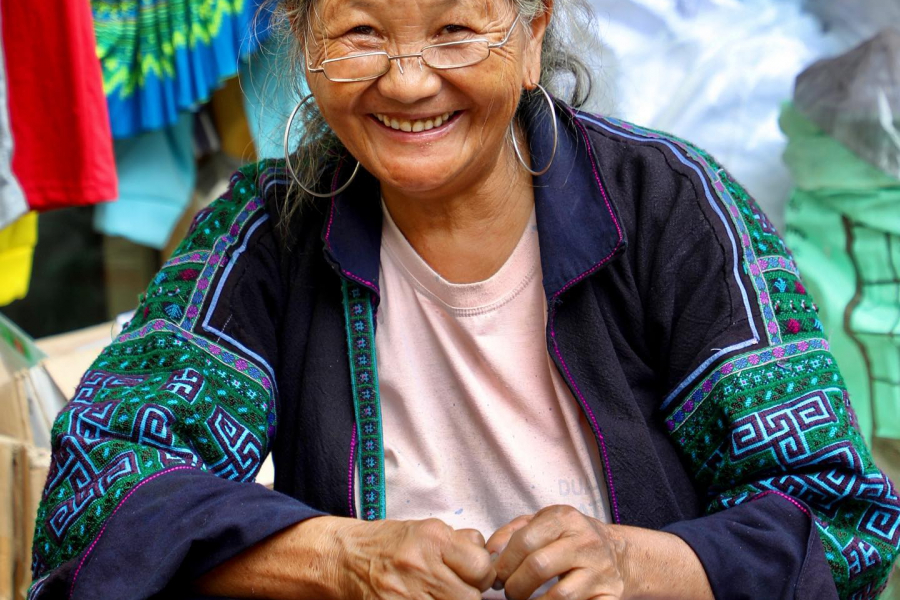
Create an account
Already have an account? Click here to sign in
By clicking submit, you agree to our Privacy Policy and Terms of Use
Sign in with your social accounts
Sign in with your email
Forgot password? Click here to get it back
Don't have an account? Sign up here
Forgot Password
The entered email has subscribed for Vietnam Tourism monthly newsletter
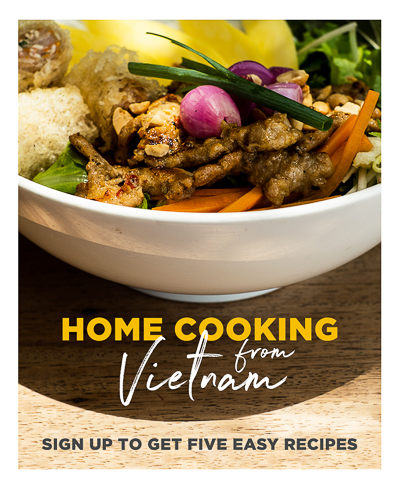
Opinion | Want to fix the border crisis? Stop playing…
Share this:.
- Click to share on Facebook (Opens in new window)
- Click to share on Twitter (Opens in new window)
- Click to share on Reddit (Opens in new window)
- Click to print (Opens in new window)
- Opinion Columns
- Guest Commentary
- Letters to the Editor
- Editorial Board
- Endorsements
Opinion | Want to fix the border crisis? Stop playing politics and start working together.

The men and women of the Border Patrol are doing their job as best they can under extremely difficult circumstances. It is clear to me that they are overwhelmed. Our asylum system is broken. The numbers of people trying to come in have skyrocketed as migrants from all over the world, not just Mexico and South America, seek a better life in America.
According to a report by the Brookings Institution, out of the total population of individuals seeking to immigrate to the U.S., Mexicans are still the largest group of U.S. immigrants at 24%, but this is down from 30% in 2000. Other countries that follow include India at 6%, China at 5%, the Philippines at 4%; El Salvador, Vietnam, Cuba, and the Dominican Republic at 3%; and Guatemala and Korea at 2%. At the Campo Station that I visited last week, Ecuador and Colombia are the top two countries of origin.
We need to hire thousands of new Border Patrol agents to keep up with the challenges they face. We also need to make it easier for the Border Patrol to fill vacancies, a challenge exacerbated by the large number of Border Patrol agents planning to retire in the next five years.
We must also dramatically reduce the current immigration backlog. According to research by the Brookings Institution, as of January 2024, there was a backlog of 3.3 million cases in the immigration courts. California has the third largest immigration court backlog among the states, with cases that can take 2 to 3 years or longer to get a hearing. As of January, only 682 immigration judges were serving on the bench. Given the enormous increase in migrants, the new average number of pending cases per judge is 4,500. Per the Congressional Research Service, doubling the current number of judges would end the backlog by 2032.
The bipartisan border security bill crafted by Senators James Lankford (R-OK), Kyrsten Sinema (I-AZ), and Chris Murphy (D-CT) would have helped dramatically in these areas. But the bill also had its limitations. Enforcement alone isn’t enough.
We need to ensure there are safe, legal ways for people to immigrate into the U.S. while also making it harder to come here illegally, and we need to provide a pathway to citizenship for those who meet certain qualifications.
This includes Dreamers and other undocumented immigrants who have lived here for many years, pass a background check, and pay taxes, especially those married to a U.S. citizen, or those stuck waiting several years on their cases. The same should be true for caregivers to a spouse or child who is a U.S. citizen.
It is unfortunate that former President Donald Trump and House Speaker Mike Johnson sabotaged a strong bipartisan border security bill from becoming law, to instead play politics with border security to score political points during an election year.
But what also concerns me is the language of hatred and fear Trump regularly uses to talk about immigrants, which only further emboldens extremists. From his public statements as well as those of his key advisor Stephen Miller, we know Trump would attempt to deport Dreamers and others who have lived and worked here for decades. Mass deportations of millions and family separation policies are wholly inconsistent with our values as Americans, not to mention that such policies would have a devastating impact on our economy.
These issues are personal to me as the grandson of Mexican immigrants on my mother’s side who came here last century searching for a better life. My grandparents worked hard, played by the rules, and achieved the American dream that enabled their children to succeed. Now, their youngest grandson is a United States Congressman.
As policymakers, we can either use the issue of immigration to selfishly fortify our political agendas or instead work together to ensure legal immigration complements border security in a genuine way that improves the situation in the short- and long-term. My view is that this is fundamentally a national security issue and should be nonpartisan. I think you deserve for your elected leaders to do better than point fingers.
Mike Levin represents California’s 49th congressional district.
- Newsroom Guidelines
- Report an Error
More in Opinion

SUBSCRIBER ONLY
Opinion | state high court should uphold proposition 22.

Opinion | Ditch the subsidies to get more housing

Opinion | How California’s bursting budget morphed into a $45 billion deficit in just two years

Opinion | Capital punishment might satisfy retributivist instincts. But it’s still unjust and should be abolished.

Title: Revealing Secrets About Deep Australia-UK-US Intelligence Connections
The AUKUS trilateral security arrangements mark a profound step in deepening security ties between three long-standing, English-speaking democracies. Examining the realm of the most trusted and most secretive domain of Signals Intelligence (SIGINT) helps explain how such a compact came to exist.
Introduction
The extent to which ties between the United States and Australia have deepened recently has surprised many . However, the AUKUS partnership, which emerged in a September 2021 meeting between President Joe Biden, Prime Minister Boris Johnson, and Prime Minister Scott Morrison, should not come as a surprise. After all, the connections upon which AUKUS is built stretch back to 1942 and the SIGINT collaboration that developed during the War in the Pacific.
The United States and Australia are both English-speaking, continent-spanning, bicameral, federal, and constitutional democracies. However, Australia’s ties with the United States go beyond cultural commonalities. This relationship includes the ANZUS security pact (considered the heart of the broad and mature US-Australia relationship) and the Quadrilateral arrangements (addressing health, security, climate, and infrastructure). This is matched on the economic front, as the US is the largest source of foreign direct investment in Australia. However, as a part of the Signals Intelligence (SIGINT), ‘Five Eyes’ security and intelligence ties, trusted and highly classified cooperation has played a key role in deepening US-Australia relations. Due to such past collaboration, the trilateral AUKUS pact, which covers nuclear propulsion for submarines, advanced technology, critical minerals, and climate-related technology should be viewed as a continuation and deepening of US-Australia military collaboration.
The History of US-Australia Intelligence Cooperation
The breadth and depth of security ties are well captured in Australia’s American Alliance . However, a seldom discussed aspect of US-Australia relations lies in the domain of SIGINT. Understanding the implications of SIGINT for contemporary US intelligence and foreign policy helps explain the AUKUS decision.
Since 1942, US-Australia collaboration has laid the foundations of trusted engagement and sensitive information sharing. That year, US General Douglas MacArthur arrived in Australia to establish the Headquarters Southwest Pacific Area (HQ SWPA) , backed by the Australian SIGINT enterprise that was integrated under US leadership.
These combined bodies were given non-descript titles to deflect attention from their military purposes. Working under HQ SWPA, the Central Bureau, for instance, was the combined Australian Army, Royal Australian Air Force, US Army, and US Army Air Force SIGINT agency. By 1945, it employed thousands of Australians and Americans to fight the Pacific War. This wartime collaboration would have an enduring legacy and strengthen US-Australia bonds for generations to follow.
During the Pacific War, the US Navy, working mostly with Admiral Chester Nimitz in Hawaii, combined its SIGINT elements with those of the Royal Australian Navy (RAN) in the South Pacific to form Fleet Radio Unit Melbourne ( FRUMEL ). Together they broke codes and interpreted messages that aided in the decisive Battle of Midway. The close and trusted collaboration made a difference in the progression and outcome of World War II (WWII). That impact was so profound that the United States and the United Kingdom extended their trusted and secret collaboration to Australia once the Cold War set in.
SIGINT revealed signs of Soviet duplicity. For example, SIGINT uncovered that the Soviet Union had been passing information about Allied plans to Japan, hoping to increase Allied casualties and extend the war in Asia . [1] Venona, the cover name for US efforts to decode Soviet diplomatic traffic, pointed to a nest of Soviet spies in the United States and Australia. For Australia to remain ‘in the club’ for intelligence sharing after the war, it had to assure the United Kingdom and the United States that it would reform to strengthen its domestic counter-espionage efforts. To do so, Prime Minister Ben Chifley established the Australian Security Intelligence Organisation ( ASIO ) in 1949.
Meanwhile, another new intelligence collection organization emerged from the wartime Australian SIGINT elements. The Australian Signals Intelligence Centre was established but given an anodyne cover name–the Defense Signals Bureau (DSB), now the Australian Signals Directorate (ASD)–intended, again, to deflect attention from its secret purpose. [2] With early British support, covering cryptographic and computing shortfalls left by the evacuation of American forces from Australia, DSB became a trusted partner of an intelligence network spanning five countries. Only officials from the United States, the United Kingdom, Canada, Australia, and New Zealand, later known as the ‘Five Eyes,’ were permitted to view DSB reports.
Australia’s SIGINT enterprise would provide support to US military forces on operations in Korea, Vietnam, [3] East Timor , Iraq, Afghanistan , and beyond. Along the way, ties and collaboration between the United States and Australia deepened.
Technological Developments in SIGINT
Electro-mechanical IBM computers aided Allied decoding and helped shorten WWII. These machines relied on intuition and deep knowledge of the target language and its etiquette to unpick the opening threads (often polite greetings). They helped sift through millions of code permutations.
By the mid to late 1990s, the digital revolution had arrived, transforming communications. Analog radio transmissions were overtaken by digital transmissions, but the digital revolution reached much further. [4] Cray computers helped crunch millions of potential code-breaking solutions. US-Australia collaboration on this happened as a matter of routine, building on decades of trusted exchanges.
The introduction of personal computers , laptops, personal devices, and mobile cell phones meant that society, industry, and the military transitioned from being web-enabled to web-dependent and, in turn, web-vulnerable. Cyber security needs, therefore, grew exponentially. Working closely with US counterparts, Australian mathematicians and cryptographers developed defensive computer emergency response teams, which became known as cyber security teams.
Businesses and civil society also realized the need for cyber security expertise. As a result, SIGINT, a once secretive organization, went from serving government intelligence needs to engaging with the public, providing a web portal and advertisements to warn of potential cyber threats. [5] As the concept of the ‘Five Eyes’ became commonplace, the breadth and scale of SIGINT cooperation brought trust and respect for Australia in Washington DC.
The Significance of AUKUS
US-Australia trusted collaboration has survived over eighty years and continues to impact current affairs. AUKUS exemplifies such long-lasting ties. After being passed by the US Congress in 2023, AUKUS has led Australia to contribute to resourcing the US nuclear-powered attack submarine (SSN) production line. Australia is interested in SSNs because its aging fleet of diesel-electric propulsion submarines (SSKs) has become vulnerable. Such submarines are no longer viable for Australia because of their vulnerability to aerial detection and strikes. Satellite coverage, drones, and artificial intelligence (AI) can detect the wake of the submarine funnels when they raise their snorkel to recharge their batteries. Given that stealth had been their only advantage over surface warships, SSKs are no longer useful for long transits. Thus, nuclear propulsion and SSNs are the only viable options for countries with vast ocean distances to transit even to cover their own exclusive economic zones. For Australia, an SSK cannot transit from any domestic or foreign major port to the submarine base in Western Australia without possible detection. [6] In wartime, that presents a great risk.
Operationally, the benefits of SSNs are considerable. Australian submarines are intended to help defend vital shipping lanes for both US and Australian companies. SSNs can travel faster than SSKs (about 20 knots instead of 6.5 knots) and stay on station for longer. A fleet of SSNs should generate three times the effective deployable time compared to the current Australian SSKs because SSNs can deploy faster, loiter longer, and remain undetected without needing to recharge batteries.
Through AUKUS, Australia has entered into an arrangement with the United Kingdom and the United States expected to last decades. Australia pursues strong deterrence against coercion or attack on its security partners and interests in Southeast Asia and the Pacific to maintain the status quo. This involves having US SSNs operate in and around Cockburn Sound on rotation on an interim basis, while efforts to supply Australian SSNs are underway (Pillar I of AUKUS). It also involves collaboration on advanced military-related technology, critical minerals, and climate-related technology (Pillar II). AUKUS is the only model that is politically feasible domestically for Australia and which helps bolster international security.
SSNs are particularly useful to deter the challenge emerging from an assertive, coercive, and expansionist China, which is expected to peak in the coming decade. US and UK SSNs are forming a Submarine Rotation Force-West based at Garden Island on Cockburn Sound in Australia, and a Virginia class submarine visited the island in late 2023. This force will be supported by advanced maintenance facilities, which are already being built.
The geostrategic significance of those submarine facilities echoes their utility from eighty years back–when trusted SIGINT connections first emerged during the Pacific War . Most may not yet fully appreciate that Australia’s current importance to US interests in the Indo-Pacific echoes decades of past cooperation. The strategic rationale and the trusted collaboration, upon which AUKUS builds, is now well-established.
Conclusion and Policy Recommendation
With present geostrategic challenges echoing those from earlier generations, trusted collaboration on SIGINT and now AUKUS is more important than ever. Passed in 2023, the National Defense Authorization Act (NDAA) made considerable progress and displayed US bipartisan support for collaboration with Australia. That has been matched by legislative changes in the United Kingdom and Australia. Such legislation seeks to open the path for a surge in trusted collaboration on science and technology and enhance each other’s defense industrial capacity. The benefits for all three nations are expected to be greater than the sum of their parts.
Unfortunately, the International Traffic in Arms Regulations (ITAR) continue to restrict trade in defense-related items and services. Such regulations inhibit trusted collaboration on research and bolstering each other’s industrial capacity. ITAR presents a significant obstacle to AUKUS cooperation. The US State Department, supporting agencies, and Congress must remove ITAR restrictions to realize the full promise of AUKUS. Bureaucracy has its own inertia, which often enough requires visionary leadership to overcome. Lifting ITAR restrictions for Australia and the United Kingdom would enable the transfer of nuclear propulsion technology to Australia. In addition, it would enable the increased manufacturing and stockpiling of advanced defense-related technologies and munitions – reflecting a growing awareness of the need to bolster industrial capacity and resilience.
For more than eighty years, Australia, the United States, and the United Kingdom have shared their most sensitive intelligence secrets. That trust has been matched by military practitioners on battlefields around the globe. Now, ITAR restrictions to collaborative research and design must be removed. This is necessary to strengthen and deepen military capacity amongst these like-minded security allies and deter authoritarian challengers to the established order.
[1] Desmond Bal and David Horner, Breaking The Codes: Australia’s KGB network 1944-1950 (Sydney, Allen & Unwin, 1998), pp. 73-114.
[2] David Horner, The Spy Catchers: The Official history of ASIO, Vol. I, 1949-1963 (Sydney, Allen & Unwin, 2014), p. 39.
[3] John Blaxland and Clare Birgin, Revealing Secrets: An Unofficial History of Australian Signals Intelligence and the Advent of Cyber (Sydney, University of New South Wales Press, 2023), pp. 222-261.
[4] Blaxland and Birgin, Revealing Secrets, pp. 301-331.
[5] Blaxland and Birgin, Revealing Secrets, pp. 313-321.
[6] The distance from Fremantle to Darwin, for instance, is 4024km or 2172 nautical miles. A Collins Class submarine is reputed to be able to travel 480 nautical miles submerged before a snorkel or full surfacing is required to recharge batteries. See https://www.seaforces.org/marint/Australian-Navy/Submarine/Collins-class.htm
Professor John Blaxland is the newly appointed Director of the Australian National University’s (ANU) North America Liaison Office in Washington DC. He teaches “Honeypots and Overcoats: Australian Intelligence in the World” and is co-author of Revealing Secrets; An Unofficial History of Australian Signals Intelligence and the Advent of Cyber (Sydney, UNSW Press, 2023). See his ANU bio here .
Email: [email protected]
Image Credit: picryl
- Asia & Oceania ,
- National Security ,
- United Kingdom ,
- United States
Recommended Articles

The Looming Danger of Transatlantic Disunity
The specter of transatlantic disunity has returned. The formidable success of the US and its allies in achieving unity and cohesion in the aftermath of Russia’s full-scale invasion of Ukraine…
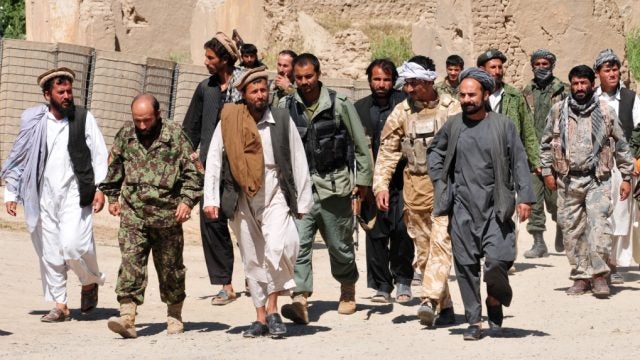
Factoring Ethnicity in Taliban’s Quest for Legitimacy: An Anthropological Rewiring of the Power Structure
Afghanistan’s stability is crucial for the regional economy and international trade. This article addresses the growing difficulties faced by the current Taliban government in Afghanistan as well as the need…

Understanding Africa’s Coups
The nine military coups in Africa since 2020 are not homogeneous. There is a diversity in causes and purposes behind these coups. However, there is a striking similarity among all…

COMMENTS
Vietnam's tourism in 2023 was still lower than pre-pandemic levels. For the current situation in Vietnam, including: total COVID-19 positive cases; total cases in Vietnam; and COVID-19 testing in Vietnam, ... Despite the fact that there are no longer any travel restrictions in Vietnam, the majority of people still wear masks. This is ...
Stay informed with the latest travel restrictions, requirements, and needed travel guidance in Vietnam in 2023 we summarized below. Quarantine requirements: There are no quarantine requirements for travelers to Vietnam. COVID-19 screening: Upon arrival in Vietnam, travelers may be subject to temperature checks.
Step 2: Click this link or access https://immigration.gov.vn/ and go to 'E-visa Issuance' then click on the link for 'Outside Vietnam foreigners'. Step 3: Upload your .jpg images (passport data page and passport photo) and fill out the required fields on the form completely. Submit your form. Step 4: Pay the e-Visa fee of 25 USD.
Entry requirements. Vietnam's Ministry of Health no longer requires travelers to show any Covid-19 vaccination certificate, or undergo any test or quarantine upon arrival in Vietnam. Travelers only need to hold a valid visa to be allowed entry, as well as carry medical or travel insurance with a minimum coverage of 10,000 USD for Covid-19 ...
Vietnam's e-Visa requirements. Prepare the following documents ahead of your application: A passport with six (6) months' validity. A photo in .jpg format of your full passport data page. A passport photo in .jpg format (4×6, white background, without glasses) A valid international credit or debit card.
Call us in Washington, D.C. at 1-888-407-4747 (toll-free in the United States and Canada) or 1-202-501-4444 (from all other countries) from 8:00 a.m. to 8:00 p.m., Eastern Standard Time, Monday through Friday (except U.S. federal holidays). See the State Department's travel website for the Worldwide Caution and Travel Advisories.
Bars in Vietnam are . Find continuously updated travel restrictions for Vietnam such as border, vaccination, COVID-19 testing, and quarantine requirements.
This page was updated on January 2023 Is Vietnam open for visitors? Yes. Vietnam has now fully opened its borders to international visitors. There are no longer any COVID‑19 entry restrictions for travel to Vietnam. This includes requirements for testing, vaccination, quarantine and entry forms. What are Vietnam's vaccine requirements? It is generally possible to […]
The Ministry of Health's most recent guidance on COVID-19 prevention and control allows travelers to enter Vietnam without being isolated, and exempts children under 2 years of age from arrival testing. The Ministry of Health issued Dispatch No. 1265/BYT-DP on COVID-19 prevention and control measures for travelers to Viet Nam. The new Dispatch has been communicated to all other Ministries ...
Health Alert - U.S. Embassy and U.S. Consulate General Ho Chi Minh City - COVID-19 Update (May 7, 2021) Locat. Due to heightened risk of COVID-19 in Vietnam, the Vietnamese Government is increasing restrictions on movement and calling for increased vigilance. Starting May 5, the Government of Vietnam instituted a 21-day quarantine period.
If you plan a trip to Vietnam, you should be aware that there are certain documents that must be gathered prior to the trip. Apart from a valid passport that must remain valid for at least 6 months from the date of your planned arrival in Vietnam, you may also need to hold a valid visa. Fortunately, since 2017, Vietnam has been offering ...
Read the country information page for additional information on travel to Vietnam. If you decide to travel to Vietnam: Enroll in the Smart Traveler Enrollment Program (STEP) to receive Alerts and make it easier to locate you in an emergency. Follow the Department of State on Facebook and Twitter. Review the Country Security Report for Vietnam.
VIETNAM ELECTRONIC VISA (E-VISA) From 15th August 2023, Vietnam grants e-visas for citizens of all countries and territories with 90-day stay duration and valid for multiple entry. Here is the list of border gates that allowed foreigners enter and exit Vietnam by E-visa. 13 international airports: Noi Bai (Ha Noi), Tan Son Nhat (Ho Chi Minh ...
In accordance with directions stated by Permanent Prime Minister Phạm Bình Minh in the Government Office's Document no. 450/VPCP-QHQT dated January, 18 th, 2022, the Immigration Department hereby announces new policies to ease entry procedures for foreigners, overseas Vietnamese and their family members as follows: - Foreigners and overseas Vietnamese, who hold valid permanent or ...
U.S. Mission Vietnam Message for U.S. Citizens Level 1 Travel Advisory for Vietnam . On April 19, 2022, the U.S. Department of State updated its Travel Advisory for Vietnam to Level 1: Exercise Normal Precautions.This upgrade reflects the decoupling of Department of State Travel Advisories and the Centers for Disease Control and Prevention (CDC)'s COVID-19 assessments.
Travel restrictions. Travel near military facilities is restricted: ... Zika virus: Advice for travellers - 31 August, 2023; COVID-19 and International Travel - 13 March, 2024; ... Plan your trip accordingly if you travel to Vietnam during this period. Dual citizenship.
FCDO travel advice for Vietnam. Includes safety and security, insurance, entry requirements and legal differences.
Travellers with symptoms of COVID-19 or those concerned they may have been exposed to the SARS-CoV-2 virus should call Vietnam's health hotline: 1900 3228. Vietnam has appointed 30 screening centres nationwide to carry out testing and diagnosis of COVID-19 disease, as well as 45 quick response teams to assist health facilities in the ...
To call for emergency services while in Vietnam, dial 115 for an ambulance, 114 for the fire department, and 113 for the police. Write these numbers down to carry with you on your trip. Learn as much as you can about Vietnam before you travel there. A good place to start is the country-specific information on Vietnam from the US Department of ...
Possessing or distributing images or objects linked to the former Republic of Vietnam, including commemorative or Vietnam War service-related items, is an offence that could attract harsh penalties. Vietnam recognises dual nationality in limited situations. If you're a dual national, travel on your Australian passport.
× External Link. You are about to leave travel.state.gov for an external website that is not maintained by the U.S. Department of State. Links to external websites are provided as a convenience and should not be construed as an endorsement by the U.S. Department of State of the views or products contained therein.
U.S. Mission Vietnam Message for U.S. Citizens Level 4 Travel Warning for Vietnam March 1, 2022 . On February 28, 2022 the U.S. Department of State updated its Travel Advisory for Vietnam and raised the Travel Advisory Level to Level 4: Do Not Travel.. This upgrade reflects the Centers for Disease Control and Prevention's (CDC) Level 4 Health Travel Notice indicating that there is a very ...
Live fully in Vietnam. Vietnam opens its door widely to welcome visitors all around the world! Starting from 15th August 2023, Vietnam extends e-visa validity to 90 days and unilateral visa exemption will be valid in 45 days! We are more than happy to welcome you all here and admire our stunning landscapes, free your soul on white sandy beaches ...
The U.S. entered a new immigration enforcement era Friday, ending a three-year-old asylum restriction and enacting a set of strict new rules that the Biden administration hopes will stabilize the ...
After being passed by the US Congress in 2023, AUKUS has led Australia to contribute to resourcing the US nuclear-powered attack submarine (SSN) ... SSNs can travel faster than SSKs (about 20 knots instead of 6.5 knots) and stay on station for longer. A fleet of SSNs should generate three times the effective deployable time compared to the ...